
Research Topics & Ideas
Biotechnology and Genetic Engineering

If you’re just starting out exploring biotechnology-related topics for your dissertation, thesis or research project, you’ve come to the right place. In this post, we’ll help kickstart your research topic ideation process by providing a hearty list of research topics and ideas , including examples from recent studies.
PS – This is just the start…
We know it’s exciting to run through a list of research topics, but please keep in mind that this list is just a starting point . To develop a suitable research topic, you’ll need to identify a clear and convincing research gap , and a viable plan to fill that gap.
If this sounds foreign to you, check out our free research topic webinar that explores how to find and refine a high-quality research topic, from scratch. Alternatively, if you’d like hands-on help, consider our 1-on-1 coaching service .

Biotechnology Research Topic Ideas
Below you’ll find a list of biotech and genetic engineering-related research topics ideas. These are intentionally broad and generic , so keep in mind that you will need to refine them a little. Nevertheless, they should inspire some ideas for your project.
- Developing CRISPR-Cas9 gene editing techniques for treating inherited blood disorders.
- The use of biotechnology in developing drought-resistant crop varieties.
- The role of genetic engineering in enhancing biofuel production efficiency.
- Investigating the potential of stem cell therapy in regenerative medicine for spinal cord injuries.
- Developing gene therapy approaches for the treatment of rare genetic diseases.
- The application of biotechnology in creating biodegradable plastics from plant materials.
- The use of gene editing to enhance nutritional content in staple crops.
- Investigating the potential of microbiome engineering in treating gastrointestinal diseases.
- The role of genetic engineering in vaccine development, with a focus on mRNA vaccines.
- Biotechnological approaches to combat antibiotic-resistant bacteria.
- Developing genetically engineered organisms for bioremediation of polluted environments.
- The use of gene editing to create hypoallergenic food products.
- Investigating the role of epigenetics in cancer development and therapy.
- The application of biotechnology in developing rapid diagnostic tools for infectious diseases.
- Genetic engineering for the production of synthetic spider silk for industrial use.
- Biotechnological strategies for improving animal health and productivity in agriculture.
- The use of gene editing in creating organ donor animals compatible with human transplantation.
- Developing algae-based bioreactors for carbon capture and biofuel production.
- The role of biotechnology in enhancing the shelf life and quality of fresh produce.
- Investigating the ethics and social implications of human gene editing technologies.
- The use of CRISPR technology in creating models for neurodegenerative diseases.
- Biotechnological approaches for the production of high-value pharmaceutical compounds.
- The application of genetic engineering in developing pest-resistant crops.
- Investigating the potential of gene therapy in treating autoimmune diseases.
- Developing biotechnological methods for producing environmentally friendly dyes.

Biotech & GE Research Topic Ideas (Continued)
- The use of genetic engineering in enhancing the efficiency of photosynthesis in plants.
- Biotechnological innovations in creating sustainable aquaculture practices.
- The role of biotechnology in developing non-invasive prenatal genetic testing methods.
- Genetic engineering for the development of novel enzymes for industrial applications.
- Investigating the potential of xenotransplantation in addressing organ donor shortages.
- The use of biotechnology in creating personalised cancer vaccines.
- Developing gene editing tools for combating invasive species in ecosystems.
- Biotechnological strategies for improving the nutritional quality of plant-based proteins.
- The application of genetic engineering in enhancing the production of renewable energy sources.
- Investigating the role of biotechnology in creating advanced wound care materials.
- The use of CRISPR for targeted gene activation in regenerative medicine.
- Biotechnological approaches to enhancing the sensory qualities of plant-based meat alternatives.
- Genetic engineering for improving the efficiency of water use in agriculture.
- The role of biotechnology in developing treatments for rare metabolic disorders.
- Investigating the use of gene therapy in age-related macular degeneration.
- The application of genetic engineering in developing allergen-free nuts.
- Biotechnological innovations in the production of sustainable and eco-friendly textiles.
- The use of gene editing in studying and treating sleep disorders.
- Developing biotechnological solutions for the management of plastic waste.
- The role of genetic engineering in enhancing the production of essential vitamins in crops.
- Biotechnological approaches to the treatment of chronic pain conditions.
- The use of gene therapy in treating muscular dystrophy.
- Investigating the potential of biotechnology in reversing environmental degradation.
- The application of genetic engineering in improving the shelf life of vaccines.
- Biotechnological strategies for enhancing the efficiency of mineral extraction in mining.
Recent Biotech & GE-Related Studies
While the ideas we’ve presented above are a decent starting point for finding a research topic in biotech, they are fairly generic and non-specific. So, it helps to look at actual studies in the biotech space to see how this all comes together in practice.
Below, we’ve included a selection of recent studies to help refine your thinking. These are actual studies, so they can provide some useful insight as to what a research topic looks like in practice.
- Genetic modifications associated with sustainability aspects for sustainable developments (Sharma et al., 2022)
- Review On: Impact of Genetic Engineering in Biotic Stresses Resistance Crop Breeding (Abebe & Tafa, 2022)
- Biorisk assessment of genetic engineering — lessons learned from teaching interdisciplinary courses on responsible conduct in the life sciences (Himmel et al., 2022)
- Genetic Engineering Technologies for Improving Crop Yield and Quality (Ye et al., 2022)
- Legal Aspects of Genetically Modified Food Product Safety for Health in Indonesia (Khamdi, 2022)
- Innovative Teaching Practice and Exploration of Genetic Engineering Experiment (Jebur, 2022)
- Efficient Bacterial Genome Engineering throughout the Central Dogma Using the Dual-Selection Marker tetAOPT (Bayer et al., 2022)
- Gene engineering: its positive and negative effects (Makrushina & Klitsenko, 2022)
- Advances of genetic engineering in streptococci and enterococci (Kurushima & Tomita, 2022)
- Genetic Engineering of Immune Evasive Stem Cell-Derived Islets (Sackett et al., 2022)
- Establishment of High-Efficiency Screening System for Gene Deletion in Fusarium venenatum TB01 (Tong et al., 2022)
- Prospects of chloroplast metabolic engineering for developing nutrient-dense food crops (Tanwar et al., 2022)
- Genetic research: legal and ethical aspects (Rustambekov et al., 2023). Non-transgenic Gene Modulation via Spray Delivery of Nucleic Acid/Peptide Complexes into Plant Nuclei and Chloroplasts (Thagun et al., 2022)
- The role of genetic breeding in food security: A review (Sam et al., 2022). Biotechnology: use of available carbon sources on the planet to generate alternatives energy (Junior et al., 2022)
- Biotechnology and biodiversity for the sustainable development of our society (Jaime, 2023) Role Of Biotechnology in Agriculture (Shringarpure, 2022)
- Plants That Can be Used as Plant-Based Edible Vaccines; Current Situation and Recent Developments (İsmail, 2022)
As you can see, these research topics are a lot more focused than the generic topic ideas we presented earlier. So, in order for you to develop a high-quality research topic, you’ll need to get specific and laser-focused on a specific context with specific variables of interest. In the video below, we explore some other important things you’ll need to consider when crafting your research topic.
Get 1-On-1 Help
If you’re still unsure about how to find a quality research topic, check out our Research Topic Kickstarter service, which is the perfect starting point for developing a unique, well-justified research topic.

You Might Also Like:

Submit a Comment Cancel reply
Your email address will not be published. Required fields are marked *
Save my name, email, and website in this browser for the next time I comment.
- Print Friendly

- USF Research
- USF Libraries
Digital Commons @ USF > College of Arts and Sciences > Molecular Biosciences > Theses and Dissertations
Molecular Biosciences Theses and Dissertations
Theses/dissertations from 2023 2023.
Exploring strain variation and bacteriophage predation in the gut microbiome of Ciona robusta , Celine Grace F. Atkinson
Distinct Nrf2 Signaling Thresholds Mediate Lung Tumor Initiation and Progression , Janine M. DeBlasi
Thermodynamic frustration of TAD2 and PRR contribute to autoinhibition of p53 , Emily Gregory
Utilization of Detonation Nanodiamonds: Nanocarrier for Gene Therapy in Non-Small Cell Lung Cancer , Allan E. Gutierrez
Role of HLA-DRB1 Fucosylation in Anti-Melanoma Immunity , Daniel K. Lester
Targeting BET Proteins Downregulates miR-33a To Promote Synergy with PIM Inhibitors in CMML , Christopher T. Letson
Regulated Intramembrane Proteolysis by M82 Peptidases: The Role of PrsS in the Staphylococcus aureus Stress Response , Baylie M. Schott
Histone Deacetylase 8 is a Novel Therapeutic Target for Mantle Cell Lymphoma and Preserves Natural Killer Cell Cytotoxic Function , January M. Watters
Theses/Dissertations from 2022 2022
Regulation of the Heat Shock Response via Lysine Acetyltransferase CBP-1 and in Neurodegenerative Disease in Caenorhabditis elegans , Lindsey N. Barrett
Determining the Role of Dendritic Cells During Response to Treatment with Paclitaxel/Anti-TIM-3 , Alycia Gardner
Cell-free DNA Methylation Signatures in Cancer Detection and Classification , Jinyong Huang
The Role Of Eicosanoid Metabolism in Mammalian Wound Healing and Inflammation , Kenneth D. Maus
A Holistic Investigation of Acidosis in Breast Cancer , Bryce Ordway
Characterizing the Impact of Postharvest Temperature Stress on Polyphenol Profiles of Red and White-Fruited Strawberry Cultivars , Alyssa N. Smith
Theses/Dissertations from 2021 2021
Multifaceted Approach to Understanding Acinetobacter baumannii Biofilm Formation and Drug Resistance , Jessie L. Allen
Cellular And Molecular Alterations Associated with Ovarian and Renal Cancer Pathophysiology , Ravneet Kaur Chhabra
Ecology and diversity of boletes of the southeastern United States , Arian Farid
CircREV1 Expression in Triple-Negative Breast Cancer , Meagan P. Horton
Microbial Dark Matter: Culturing the Uncultured in Search of Novel Chemotaxonomy , Sarah J. Kennedy
The Multifaceted Role of CCAR-1 in the Alternative Splicing and Germline Regulation in Caenorhabditis elegans , Doreen Ikhuva Lugano
Unraveling the Role of Novel G5 Peptidase Family Proteins in Virulence and Cell Envelope Biogenesis of Staphylococcus aureus , Stephanie M. Marroquin
Cytoplasmic Polyadenylation Element Binding Protein 2 Alternative Splicing Regulates HIF1α During Chronic Hypoxia , Emily M. Mayo
Transcriptomic and Functional Investigation of Bacterial Biofilm Formation , Brooke R. Nemec
A Functional Characterization of the Omega (ω) subunit of RNA Polymerase in Staphylococcus aureus , Shrushti B. Patil
The Role Of Cpeb2 Alternative Splicing In TNBC Metastasis , Shaun C. Stevens
Screening Next-generation Fluorine-19 Probe and Preparation of Yeast-derived G Proteins for GPCR Conformation and Dynamics Study , Wenjie Zhao
Theses/Dissertations from 2020 2020
Understanding the Role of Cereblon in Hematopoiesis Through Structural and Functional Analyses , Afua Adutwumwa Akuffo
To Mid-cell and Beyond: Characterizing the Roles of GpsB and YpsA in Cell Division Regulation in Gram-positive Bacteria , Robert S. Brzozowski
Spatiotemporal Changes of Microbial Community Assemblages and Functions in the Subsurface , Madison C. Davis
New Mechanisms That Regulate DNA Double-Strand Break-Induced Gene Silencing and Genome Integrity , Dante Francis DeAscanis
Regulation of the Heat Shock Response and HSF-1 Nuclear Stress Bodies in C. elegans , Andrew Deonarine
New Mechanisms that Control FACT Histone Chaperone and Transcription-mediated Genome Stability , Angelo Vincenzo de Vivo Diaz
Targeting the ESKAPE Pathogens by Botanical and Microbial Approaches , Emily Dilandro
Succession in native groundwater microbial communities in response to effluent wastewater , Chelsea M. Dinon
Role of ceramide-1 phosphate in regulation of sphingolipid and eicosanoid metabolism in lung epithelial cells , Brittany A. Dudley
Allosteric Control of Proteins: New Methods and Mechanisms , Nalvi Duro
Microbial Community Structures in Three Bahamian Blue Holes , Meghan J. Gordon
A Novel Intramolecular Interaction in P53 , Fan He
The Impact of Myeloid-Mediated Co-Stimulation and Immunosuppression on the Anti-Tumor Efficacy of Adoptive T cell Therapy , Pasquale Patrick Innamarato
Investigating Mechanisms of Immune Suppression Secondary to an Inflammatory Microenvironment , Wendy Michelle Kandell
Posttranslational Modification and Protein Disorder Regulate Protein-Protein Interactions and DNA Binding Specificity of p53 , Robin Levy
Mechanistic and Translational Studies on Skeletal Malignancies , Jeremy McGuire
Novel Long Non-Coding RNA CDLINC Promotes NSCLC Progression , Christina J. Moss
Genome Maintenance Roles of Polycomb Transcriptional Repressors BMI1 and RNF2 , Anthony Richard Sanchez IV
The Ecology and Conservation of an Urban Karst Subterranean Estuary , Robert J. Scharping
Biological and Proteomic Characterization of Cornus officinalis on Human 1.1B4 Pancreatic β Cells: Exploring Use for T1D Interventional Application , Arielle E. Tawfik
Evaluation of Aging and Genetic Mutation Variants on Tauopathy , Amber M. Tetlow
Theses/Dissertations from 2019 2019
Investigating the Proteinaceous Regulome of the Acinetobacter baumannii , Leila G. Casella
Functional Characterization of the Ovarian Tumor Domain Deubiquitinating Enzyme 6B , Jasmin M. D'Andrea
Integrated Molecular Characterization of Lung Adenocarcinoma with Implications for Immunotherapy , Nicholas T. Gimbrone
The Role of Secreted Proteases in Regulating Disease Progression in Staphylococcus aureus , Brittney D. Gimza
Advanced Proteomic and Epigenetic Characterization of Ethanol-Induced Microglial Activation , Jennifer Guergues Guergues
Understanding immunometabolic and suppressive factors that impact cancer development , Rebecca Swearingen Hesterberg
Biochemical and Proteomic Approaches to Determine the Impact Level of Each Step of the Supply Chain on Tomato Fruit Quality , Robert T. Madden
Enhancing Immunotherapeutic Interventions for Treatment of Chronic Lymphocytic Leukemia , Kamira K. Maharaj
Characterization of the Autophagic-Iron Axis in the Pathophysiology of Endometriosis and Epithelial Ovarian Cancers , Stephanie Rockfield
Understanding the Influence of the Cancer Microenvironment on Metabolism and Metastasis , Shonagh Russell
Modeling of Interaction of Ions with Ether- and Ester-linked Phospholipids , Matthew W. Saunders
Novel Insights into the Multifaceted Roles of BLM in the Maintenance of Genome Stability , Vivek M. Shastri
Conserved glycine residues control transient helicity and disorder in the cold regulated protein, Cor15a , Oluwakemi Sowemimo
A Novel Cytokine Response Modulatory Function of MEK Inhibitors Mediates Therapeutic Efficacy , Mengyu Xie
Novel Strategies on Characterizing Biologically Specific Protein-protein Interaction Networks , Bi Zhao
Theses/Dissertations from 2018 2018
Characterization of the Transcriptional Elongation Factor ELL3 in B cells and Its Role in B-cell Lymphoma Proliferation and Survival , Lou-Ella M.m. Alexander
Identification of Regulatory miRNAs Associated with Ethanol-Induced Microglial Activation Using Integrated Proteomic and Transcriptomic Approaches , Brandi Jo Cook
Molecular Phylogenetics of Floridian Boletes , Arian Farid
MYC Distant Enhancers Underlie Ovarian Cancer Susceptibility at the 8q24.21 Locus , Anxhela Gjyshi Gustafson
Quantitative Proteomics to Support Translational Cancer Research , Melissa Hoffman
A Systems Chemical Biology Approach for Dissecting Differential Molecular Mechanisms of Action of Clinical Kinase Inhibitors in Lung Cancer , Natalia Junqueira Sumi
Investigating the Roles of Fucosylation and Calcium Signaling in Melanoma Invasion , Tyler S. Keeley
Synthesis, Oxidation, and Distribution of Polyphenols in Strawberry Fruit During Cold Storage , Katrina E. Kelly
Investigation of Alcohol-Induced Changes in Hepatic Histone Modifications Using Mass Spectrometry Based Proteomics , Crystina Leah Kriss
Off-Target Based Drug Repurposing Using Systems Pharmacology , Brent M. Kuenzi
Investigation of Anemarrhena asphodeloides and its Constituent Timosaponin-AIII as Novel, Naturally Derived Adjunctive Therapeutics for the Treatment of Advanced Pancreatic Cancer , Catherine B. MarElia
The Role of Phosphohistidine Phosphatase 1 in Ethanol-induced Liver Injury , Daniel Richard Martin
Theses/Dissertations from 2017 2017
Changing the Pathobiological Paradigm in Myelodysplastic Syndromes: The NLRP3 Inflammasome Drives the MDS Phenotype , Ashley Basiorka
Modeling of Dynamic Allostery in Proteins Enabled by Machine Learning , Mohsen Botlani-Esfahani
Uncovering Transcriptional Activators and Targets of HSF-1 in Caenorhabditis elegans , Jessica Brunquell
The Role of Sgs1 and Exo1 in the Maintenance of Genome Stability. , Lillian Campos-Doerfler
Mechanisms of IKBKE Activation in Cancer , Sridevi Challa
Discovering Antibacterial and Anti-Resistance Agents Targeting Multi-Drug Resistant ESKAPE Pathogens , Renee Fleeman
Functional Roles of Matrix Metalloproteinases in Bone Metastatic Prostate Cancer , Jeremy S. Frieling
Disorder Levels of c-Myb Transactivation Domain Regulate its Binding Affinity to the KIX Domain of CREB Binding Protein , Anusha Poosapati
Role of Heat Shock Transcription Factor 1 in Ovarian Cancer Epithelial-Mesenchymal Transition and Drug Sensitivity , Chase David Powell
Cell Division Regulation in Staphylococcus aureus , Catherine M. Spanoudis
A Novel Approach to the Discovery of Natural Products From Actinobacteria , Rahmy Tawfik
Non-classical regulators in Staphylococcus aureus , Andy Weiss
Theses/Dissertations from 2016 2016
In Vitro and In Vivo Antioxidant Capacity of Synthetic and Natural Polyphenolic Compounds Identified from Strawberry and Fruit Juices , Marvin Abountiolas
Quantitative Proteomic Investigation of Disease Models of Type 2 Diabetes , Mark Gabriel Athanason
CMG Helicase Assembly and Activation: Regulation by c-Myc through Chromatin Decondensation and Novel Therapeutic Avenues for Cancer Treatment , Victoria Bryant
Computational Modeling of Allosteric Stimulation of Nipah Virus Host Binding Protein , Priyanka Dutta
Cell Cycle Arrest by TGFß1 is Dependent on the Inhibition of CMG Helicase Assembly and Activation , Brook Samuel Nepon-Sixt
Gene Expression Profiling and the Role of HSF1 in Ovarian Cancer in 3D Spheroid Models , Trillitye Paullin
VDR-RIPK1 Interaction and its Implications in Cell Death and Cancer Intervention , Waise Quarni
Regulation of nAChRs and Stemness by Nicotine and E-cigarettes in NSCLC , Courtney Schaal
Targeting Histone Deacetylases in Melanoma and T-cells to Improve Cancer Immunotherapy , Andressa Sodre De Castro Laino
Nonreplicative DNA Helicases Involved in Maintaining Genome Stability , Salahuddin Syed
Theses/Dissertations from 2015 2015
Functional Analysis of the Ovarian Cancer Susceptibility Locus at 9p22.2 Reveals a Transcription Regulatory Network Mediated by BNC2 in Ovarian Cells , Melissa Buckley
Exploring the Pathogenic and Drug Resistance Mechanisms of Staphylococcus aureus , Whittney Burda
Regulation and Targeting of the FANCD2 Activation in DNA Repair , Valentina Celeste Caceres
Mass Spectrometry-Based Investigation of APP-Dependent Mechanisms in Neurodegeneration , Dale Chaput
Advanced Search
- Email Notifications and RSS
- All Collections
- USF Faculty Publications
- Open Access Journals
- Conferences and Events
- Theses and Dissertations
- Textbooks Collection
Useful Links
- Rights Information
- SelectedWorks
- Submit Research
Home | About | Help | My Account | Accessibility Statement | Language and Diversity Statements
Privacy Copyright

Home > SSE > BIOTECH > BIOTECH_ETD
Biotechnology Program Theses and Dissertations
Theses/dissertations from 2024 2024.
Investigating the Association Between Gut Bacteria and Childhood Neuropsychiatric Disorders , Maha Abdo
Cytotoxicity, Antibacterial and Anti-Inflammatory Properties of A Synthesized Curcumin Analog and One of Its Novel Derivatives , Marian Amir
Integrative Genomic Insights into Coral Resilience: Adaptive and Acclimatory Responses to Seasonal Environmental Shifts , Tasnim Ghanim
Can miRNA be the Missing Link Between Parkinson’s Disease and Pesticides? , fatma gobba
Antibacterial and Anticancer Activities of a Fosmid Clone from Atlantis II Red Sea Brine Pool. , Marina Nabil
Deciphering the Microbial Fingerprint of COVID-19: A Multi-Layered Exploration of the Oral and Gut Microbiome Dysbiosis , Iman Mostafa Sultan
Theses/Dissertations from 2023 2023
Preparation and Characterization of Salvia triloba Extract and Evaluation of Its Cytotoxic Effect on Bone Cancer Cell Line , Basma Hossam Abdelmonem
Computational Identification of Circulating MicroRNAs Associated with the Early Stage of Ovarian Cancer , Ahmed Abdelrahman El Hosseiny
Cytotoxic Activity of Salvia Officinalis Extract Mediated by the Inhibition of JAK2 in Breast Cancer , Salma Alawadi Dawood
Plastivore: Identification and Functional Characterization of Plastic Degrading Lipase and Carboxylesterase Enzyme Families from Galleria mellonella , Joseph Boctor
Terfezia Boudieri and Terfezia Claveryi Inhibit the LPS/IFN-γ-Mediated Inflammation in RAW 264.7 Macrophages Through an Nrf2-Independent Mechanism , Abdelhameed Dawood
Metaproteomics Profiling of Gut Microbiota in Pediatric Acute Lymphoblastic Leukemia Patients , Shahd Ezz El Din
Sperm DNA Integrity in Absolute Teratozoospermia Patients and its Impact on Assisted Reproductive Technology Outcome , Dina Faris
Association of Gut Microbiota Composition with Alzheimer’s-Like Disease in A Rat Model , Hana Heiba
A Review of COVID-19 Lockdown Across Different Countries During 2020: Characterization of Risk Factors and Severity of COVID-19 in Egyptian Patients , Hanya Mohamed
Targeting the Warburg and Q Effect: Novel Strategy to Disrupt Cancer Metabolism , Mahmoud Adel Mohamed
Molecular Diagnosis of Non X-linked Ectodermal Dysplasias Using Next Generation Sequencing , Eman AbdelAlim Rabie
Effects of Date Seed (Phoenix dactylifera) Extract in an Animal Model of Diabetes Mellitus , Sara Refaat
Neuroprotective Effects of Green Tea (Camellia Sinensis) and Broccoli (Brassica Oleracea) Extracts in an In Vitro Model of Multiple Sclerosis , Sara Taha Fathallah
Metabolomics Unveiled: Decoding Platelet Dynamics in Smokers, and Head-Neck Cancer Patients , Anthony Nasr Tanios
Theses/Dissertations from 2022 2022
A Predictive Model for Geographical Location Using Microbiome Composition and COVID-19 Based Analysis , Ahmed Adel Aboushanab
Characterization of Testis-Derived Mesenchymal Cells and the Hunt for Universal Stemness Markers , Myret Ghabriel
Knockdown of MDM2 in HepG2 Cell Line: A Step Towards Understanding the Relation Between miRNA590-3p and its Downstream Target Gene, MDM2, in Hepatocellular Carcinoma , Jihad Mahmoud
MiRNAs levels in a Streptozocin model of Alzheimer’s disease , Nada Moustafa
Selective GSK3β inhibition mediates an Nrf2-independent anti-inflammatory microglial response , Mohamed H. Yousef
Theses/Dissertations from 2021 2021
Optimization of In-Vitro Tissue Culture and Transformation System for Sweet Sorghum Cultivars Using Immature Inflorescence , Logayn Abushal
Identifying MicroRNAs Panel Associated With Hepatocellular Carcinoma in Serum of Chronic Hepatitis C Patients , Areeg Dabbish
Analysis of Single Cell RNA-seq Data Revealed Interferon Gamma Signaling Alteration in Severe COVID patients , Ahmed Elbaz
Herbal Extracts as Neuroprotective Agents in an In-vitro Model of Aluminum Neurotoxicity , Nada Ezzelarab
Anti-angiogenic effects of chemotherapeutic agents and their enhancement with OT-515 and S-NACH , Shimaa Adel Heikal
Autophagic Reprogramming of Bone Marrow-Derived Macrophages , Mayada Mahmoud Zaki Mohamed Mazher
Autophagic Reprogramming of Macrophages Polarization , Mayada Mahmoud Zaki Mohamed Mazher
Evaluation of the Anticancer Potential of Alchemilla vulgaris Extract Against Human Neuroblastoma Cells , Yomna Moqidem
Role of Ataxia Telangiectasia Mutated in the Repair of Magnetite Nanoparticles Induced Double Strand Breaks Associated with Heterochromatin , Mie Mohamed Mounir
Assessment of the Potential Anti-tumour Effect of Salvia triloba and the Combination of Salvia triloba and Paclitaxel on Ovarian Cancer: SKOV3 Cell Line , Naela Saleh
Insights Into Halophilic Microbial Adaptation: Analysis of Integrons and Associated Genomic Structures and Characterization of a Nitrilase in Hypersaline Environments , Sarah Sonbol
Mining Selected Metagenomes/metatranscriptomes for Biosynthetic Gene Clusters and Antimicrobial Resistance Genes , Ahmed Yamany
Theses/Dissertations from 2020 2020
Evaluation of the cytotoxic effect of Salvia triloba on Osteosarcoma (U2OS) cell line , Rowan Bahaa El-din Abd El-bary
The crosstalk between COBRA1 and Wnt/β-catenin signaling in cervical cancer , Omnia Mahmoud Abdelraheem
A patient-specific adaptation of the Living Human Heart Model in application to pulmonary hypertension , Yousof Abdel-Raouf
Analysis of single-cell RNA-Seq reveals dynamic changes during macrophage state transition in atherosclerosis mouse model , Ahmed Safwat Abouhashem
The anti-diabetic potential of the African Adansonia Digitata L. plant extract , Marwa Tawfik Badawy
In-depth analysis of culturable microalgae diversity in the river Nile at different locations , Amal Abouel-Fetouh Badr
Expression Levels of miR-590-3p in Hepatocellular Carcinoma and Osteosarcoma Cell Lines and its Downstream Target Genes , Mennatallah Mohamed Bassem Mahmoud Elfar
Fabrication and characterization of polycaprolactone-based nanofibrous scaffolds for neuronal tissue regeneration , Manar Ahmed Elnaggar
Profiling Genome-Wide DNA Methylation Patterns in Human Aortic and Mitral Valves , Sarah Halawa
Role of Ataxia Telangiectasia mutated in the repair of Magnetite Nanoparticles induced double strand breaks associated with Heterochromatin , Mie Mohamed Mounir
Circulating microRNAs in neuromuscular disorders , Nahla Mousa
Assessment of forage quality Among the sudangrasses, sweet and grain sorghum inbred lines at different cutting time points , Muziri Mugwanya
Novel DNA ligases from the Red Sea brine pools: Cloning, expression, in silico characterization and comparative thermostability , Iyanu Mumeen Oduwole
Role of microRNA-208a as a diagnostic and prognostic marker in patients with ST-elevation myocardial infarction , Abou bakr Mohamed Mohamed Hammad Salama
MiR-590-3p suppresses cellular migration and clonogenicity and epithelial to mesenchymal transition in the HepG2 cell line by targeting MDM2 and SETD7 , Alaa Youssef
Theses/Dissertations from 2019 2019
Modulation of stress response in Rice via genome editing of splicing factors , Dina Abou-Raiya
Fabrication of pomegranate peel extract/honey nanofibers loaded with bee venom as effective antibacterial wound dressings , Sara Abouzekry
Direct conversion of mouse fibroblasts into osteoblasts and investigating COBRA1 expression responce , Walid Almoafy Alasar
Identification, expression and biochemical characterization of AMP phosphorylases from extreme environments , Noha Attallah
Novel antimicrobial peptide with anticancer properties , Sheri Magdy Saleeb Bakheit
Predictions and Computational Analysis of Novel Chromosomal Type II Toxin Antitoxin Systems in the Human Oral Microbiome , Ashraf Abd-el-Raouf Bazan
Fabrication of layer-by-layer ECM/polysaccharides/electrospun composite nanofibrous scaffolds and hydrogels for in-vitro skin cell regeneration , Fatma Nabil El-Shishiny
Evaluating the bioactivity and biocompatibility of nylon coated ultra-high molecular weight polyethylene (UHMWPE) , Nancy Hassanein
Molecular and Functional dissection of IgaA, the negative regulator of the E.coli Rcs system. , Nahla A. Hussein
Growth factor-free and antimicrobial elastic nanocomposites for bone regeneration , Dina Mohsen Ibrahim
The effect of Ephedra foeminea on human bone osteosarcoma U2OS cell viability and migration , Eric Zadok Mpingirika
Genetic diversity comparison among invasive fish populations (Nemipterus randalli and Serranus cabrilla) from Mediterranean and Red Sea coastal waters using cytochrome c oxidase subunit I (COI) , Joel Ogwang
Turmeric/ Oregano extracts as wound healing agents in a diabetic animal model , Diana Guirguis Sami
Mining for specialized metabolism genes in Red Sea brine pool prokaryotic metagenomes for antibacterial and anticancer activities , Laila Ziko
Theses/Dissertations from 2018 2018
HeLa cell line, a model to study the role of cofactor of BRCA1 in cervical cancer , Noha Saad Abd Elhamied
The interplay of genetic variation and regulation of long noncoding RNAs in colorectal cancer , Amany Abdel-Motaleb
Evaluating the efficacy of liposomal delivery of nedaplatin in enhancing cytotoxicity, genotoxicity and DNA damage in lung, breast, and osteosarcoma cancer cell lines , Salma Abdelnaser
Therapeutic potential of curcumin in a spinal cord injury model: Local application versus dietary supplement , Sarah Kamel Farahat Abu hussein
Evaluation of cytotoxic potential of loratadine and the combination of loratadine and cisplatin on hepatocellular carcinoma cell lines , Nouran Adly
Mining the red sea metagenomics libraries for betaine pathways , Sherouk Allam
The effect of adding radiotherapy to the administrated chemotherapy on infants' gut microbiome , Nourhan Elsahly
Cytotoxic activity of the Red Sea anemone entacmaea quadricolor on liver cancer cells , Noha Moataz El Salakawy
Cofactor of BRCA1 promotes epithelial-mesenchymal transition and cell proliferation in intermediate stage hepatocellular carcinoma cell line , Mennatallah Ghouraba
Prevalence and determinants of self-medication with antibiotics in high and low-income areas within Cairo , Shaymaa Mohamed Hassan
Expression analysis of liver-specific circulating micrornas in hcv-induced hepatocellular carcinoma in Egyptian patients , Lobna Mohamed Mourad
Theses/Dissertations from 2017 2017
MicroRNAs as noninvasive biomarkers for the diagnosis and prognosis of liver fibrosis in HCV genotype 4 patients , Amanda Abdel-Al
Development of immuno- nanoparticles for targeting schistosoma parasites , Eman Rabie Abdul-Ghany
Virome of red sea brine pools and other hydrothermal vents , Sherry Kamal Berty Aziz
Impacts of exposure to low concentration of titanium dioxide nanoparticles on cell cycle control and DNA repair in normal, cancer and DNA repair deficient cells. , Nada EL Zahed
Transcriptional response to stressors in arabidopsis thaliana , Aya Abd Elsalam Galal
Analysis of the thermal stability of mercuric reductase from the hot brine environment of Atlantis II in the Red Sea by site-directed mutagenesis: Structural interpretation of thermolabile and enhanced thermostable mutants , Mohamad Maged Galal
Translational profiling of adipocytes within adipose depots and intermuscular adipose tissues , Sara Serag Hassan
Induced pluripotent stem cells derived from mouse germ cells , Nora Khan
Characterization of aggresome formation in choroid plexus carcinoma. , Marwa Mohamed Ali Nassar
Mannose binding lectin in the treatment of imiquimod induced psoriasis mouse model , Hagar Nofal
Molecular adaptation of mercuric reductase to hypersaline environments , Emanbellah Ramadan
Theses/Dissertations from 2016 2016
In silico screening, analysis, and modelling for a novel anticancer peptide , Youssef Abdou
Genome-wide transcriptomic analysis of alternative splicing modulation in Arabidopsis thaliana , Moustafa Ahmed Abohawya
Transcriptomic profiling of the extremophile eutrema salsugineum response to environmental stressors , Diana Abou El Hassan
Analysis of the D1S80 VNTR locus polymorphism in the Nubian population , Soha Rabie Ahmed
Antibiotic resistance in Red Sea brine pools , Ali Hassan Ali Elbehery
Calcified gelatin nanofibers for guided tissue regeneration using water-based benign solvent: An investigation for periodontal applications , Nihal Abdelnabi Elsayed
In silico identification and in Vitro assessment of a potential anticancer peptide sequence retrieved from the red sea metagenomics library , Mona Elradi Imam
Overexpression of cofactor of BRCA1 in HepG2 cells: A step towards understanding the role of COBRA1 in hepatocellular carcinoma , Razan Jamil Masad
The microbiome of The Egyptian Red Sea proper and Gulf of Aqaba , Ghada Alaa El-Din Mustafa
Regulatory networks in non-small cell lung cancer: Connecting differentially expressed genes, miRNAs, and incRNAs , Jasmine Omran
Identification of XPA and XPC gene mutations in patients with xeroderma pigmentosum , Eman AbdelAlim Sidky Rabie
Theses/Dissertations from 2015 2015
Isolation, propagation and characterization of mouse testis-derived mesenchymal stromal cells , Mai Abdul Rahman
- Collections
- Disciplines
Advanced Search
- Notify me via email or RSS
Home | About | FAQ | My Account | Accessibility Statement
Privacy Copyright
ScholarWorks@UMass Amherst
Home > CNS > BIOCHEM > MCB > MCB_THESES
Molecular and Cellular Biology Masters Theses Collection
Theses from 2024 2024.
The Impact of a Non-ionic Adjuvant to the Persistence of Pesticides on Produce Surfaces , Daniel Barnes, Molecular & Cellular Biology
Investigating the Role of Got2 in Murine Organogenesis and Placenta Development , Olivia Macrorie, Molecular & Cellular Biology
Chromatin Accessibility Impacts Knockout of Mt-Bell4 Transcription Factor , Thomas Redden, Molecular & Cellular Biology
UNDERSTANDING THE FUNCTIONAL IMPACT OF DISEASE-ASSOCIATED PHOSPHORYLATION SITES ON THE NEURODEGENERATIVE PROTEIN TAU , Navya T. Sebastian, Molecular & Cellular Biology
Theses from 2023 2023
Elucidating the Priming Mechanism of ClpXP Protease by Single-Domain Response Regulator CpdR in Caulobacter crescentus , Kimberly E. Barker, Molecular & Cellular Biology
The Discovery of a Novel Bacteria from a Large Co-assembly of Metagenomes , Matthew Finkelberg, Molecular & Cellular Biology
Investigating Diterpene Biosynthesis in Medicago Truncatula , Sungwoo Hwang, Molecular & Cellular Biology
Combining Simulation and the MspA Nanopore to Study p53 Dynamics and Interactions , Samantha A. Schultz, Molecular & Cellular Biology
Caulobacter ClpXP Adaptor PopA’s Domain Interactions in the Adaptor Hierarchy of CtrA Degradation , Thomas P. Scudder, Molecular & Cellular Biology
Climate Change, Giant Viruses and Their Putative Hosts , Sarah K. Tucker, Molecular & Cellular Biology
Theses from 2022 2022
Changes in Gene Expression From Long-Term Warming Revealed Using Metatranscriptome Mapping to FAC-Sorted Bacteria , Christopher A. Colvin, Molecular & Cellular Biology
Determining CaMKII Variant Activities and Their Roles in Human Disease , Matthew J. Dunn, Molecular & Cellular Biology
Developmental Exposures to PFAS Mixtures Impair Elongation of the Exocrine Pancreas in Zebrafish (Danio rerio) , Emily M. Formato, Molecular & Cellular Biology
A Metatranscriptomic Analysis of the Long-Term Effects of Warming on the Harvard Forest Soil Microbiome , Brooke A. Linnehan, Molecular & Cellular Biology
Characterization of the Poly (ADP-Ribose) Polymerase Family in the Fusarium oxysporum Species Complex , Daniel Norment, Molecular & Cellular Biology
Theses from 2021 2021
Exploring Knockdown Phenotypes and Interactions between ATAD3 Proteins in Arabidopsis thaliana , Eli S. Gordon, Molecular & Cellular Biology
Development of a Site-Specific Labeling Assay to Study the Pseudomonas aeruginosa Type III Secretion Translocon in Native Membranes , Kyle A. Mahan, Molecular & Cellular Biology
Liposomal Nanoparticles Target TLR7/8-SHP2 to Repolarize Macrophages to Aid in Cancer Immunotherapy , Vaishali Malik, Molecular & Cellular Biology
Hsp70 Phosphorylation: A Case Study of Serine Residues 385 and 400 , Sashrika Saini, Molecular & Cellular Biology
Activation of Nrf2 at Critical Windows of Development Alters Protein S-Glutathionylation in the Zebrafish Embryo (Danio rerio) , Emily G. Severance, Molecular & Cellular Biology
Utilizing Fluorescence Microscopy to Characterize the Subcellular Distribution of the Novel Protein Acheron , Varun Sheel, Molecular & Cellular Biology
Theses from 2020 2020
The Association Between Sperm DNA Methylation and Sperm Mitochondrial DNA Copy Number , Emily Houle, Molecular & Cellular Biology
Gene Expression Regulation in the Mouse Liver by Mechanistic Target Of Rapamycin Complexes I and II , Anthony Poluyanoff, Molecular & Cellular Biology
Sperm Mitochondrial DNA Biomarkers as a Measure of Male Fecundity and Overall Sperm Quality , Allyson Rosati, Molecular & Cellular Biology
Exploration of the Association between Muscle Volume and Bone Geometry Reveals Surprising Relationship at the Genetic Level , Prakrit Subba, Molecular & Cellular Biology
Theses from 2019 2019
Studies on the Interaction and Organization of Bacterial Proteins on Membranes , Mariana Brena, Molecular & Cellular Biology
Investigating The Role Of LBH During Early Embryonic Development In Xenopus Laevis , Emma Weir, Molecular & Cellular Biology
Theses from 2018 2018
Exploring the Influence of PKC-theta Phosphorylation on Notch1 Activation and T Helper Cell Differentiation , Grace Trombley, Molecular & Cellular Biology
Theses from 2017 2017
Partial Craniofacial Cartilage Rescue in ace/fgf8 Mutants from Compensatory Signaling From the Ventricle of Danio Rerio , Douglas A. Calenda II, Molecular & Cellular Biology
THE FAR C-TERMINUS OF TPX2 CONTRIBUTES TO SPINDLE MORPHOGENESIS , Brett Estes, Molecular & Cellular Biology
Characterization of Calcium Homeostasis Parameters in TRPV3 and CaV3.2 Double Null Mice , Aujan Mehregan, Molecular & Cellular Biology
Microtransplantation of Rat Brain Neurolemma into Xenopus Laevis Oocytes to Study the Effect of Environmental Toxicants on Endogenous Voltage-Sensitive Ion Channels , Edwin Murenzi, Molecular & Cellular Biology
Regulation of Katanin Activity on Microtubules , Madison A. Tyler, Molecular & Cellular Biology
Theses from 2016 2016
The Role of MicroRNAs in Regulating the Translatability and Stability of Target Messenger RNAs During the Atrophy and Programmed Cell Death of the Intersegmental Muscles of the Tobacco Hawkmoth Manduca sexta. , Elizabeth Chan, Molecular & Cellular Biology
An in Vivo Study of Cortical Dynein Dynamics and its Contribution to Microtubule Sliding in the Midzone , Heather M. Jordan, Molecular & Cellular Biology
A Genetic Analysis of Cichlid Scale Morphology , Kenta C. Kawasaki, Molecular & Cellular Biology
Modulation of Notch in an Animal Model of Multiple Sclerosis , Manit Nikhil Munshi, Molecular & Cellular Biology
One-Carbon Metabolism Related B-Vitamins Alter The Expression Of MicroRNAS And Target Genes Within The Wnt Signaling Pathway In Mouse Colonic Epithelium , Riccardo Racicot, Molecular & Cellular Biology
Characterizing the Inhibition of Katanin Using Tubulin Carboxy-Terminal Tail Constructs , Corey E. Reed, Molecular & Cellular Biology
The Identification of Notch1 Functional Domains Responsible for its Physical Interaction with PKCθ , Wesley D. Rossiter, Molecular & Cellular Biology
Dynamics of Microtubule Networks with Antiparallel Crosslinkers , Kasimira T. Stanhope, Molecular & Cellular Biology
Modifications of Myofilament Structure and Function During Global Myocardial Ischemia , Mike K. Woodward, Molecular & Cellular Biology
Theses from 2015 2015
Regulation of Jak1 and Jak2 Synthesis through Non-Classical Progestin Receptors , Hillary Adams, Molecular & Cellular Biology
Antineoplastic Effects of Rhodiola Crenulata on B16-F10 Melanoma , Maxine Dudek, Molecular & Cellular Biology
RNAi Validation of Resistance Genes and Their Interactions in the Highly DDT-Resistant 91-R Strain of Drosophila Melanogaster , Kyle Gellatly, Molecular & Cellular Biology
Characterization of Protein-Protein Interactions for Therapeutic Drug Design Utilizing Mass Spectrometry , Alex J. Johnson, Molecular & Cellular Biology
Promoting Extracellular Matrix Crosslinking in Synthetic Hydrogels , Marcos M. Manganare, Molecular & Cellular Biology
Characterization of the Reconstituted and Native Pseudomonas aeruginosa Type III Secretion System Translocon , Kathryn R. Monopoli, Molecular & Cellular Biology
Thermocycle-regulated WALL REGULATOR INTERACTING bHLH Encodes a Protein That Interacts with Secondary-Cell-Wall-Associated Transcription Factors , Ian P. Whitney, Molecular & Cellular Biology
Theses from 2014 2014
Engineering Camelina sativa for Biofuel Production via increasing oil yield and tolerance to abiotic stresses , Kenny Ablordeppey, Molecular & Cellular Biology
Designing a Pore-Forming Toxin Cytolysin A (ClyA) Specific to Target Cancer Cells , Alzira Rocheteau Avelino, Molecular & Cellular Biology
The Role of the Novel Lupus Antigen, Acheron, in Moderating Life and Death Decisions , Ankur Sheel, Molecular & Cellular Biology
Expression and Purification of Human Lysosomal β-galactosidase from Pichia Pastoris , Sarah E. Tarullo, Molecular & Cellular Biology
Properties of Potential Substrates of a Cyanobacterial Small Heat Shock Protein , Yichen Zhang, Molecular & Cellular Biology
Theses from 2013 2013
Characterizing the Heavy Metal Chelator, Tpen, as a Ca2+ Tool in the Mammalian Oocyte , Robert A. Agreda Mccaughin, Molecular & Cellular Biology
Sustainable Biofuels Production Through Understanding Fundamental Bacterial Pathways Involved in Biomass Degradation and Sugar Utilization , James CM Hayes, Molecular & Cellular Biology
Stiffness and Modulus and Independent Controllers of Breast Cancer Metastasis , Dannielle Ryman, Molecular & Cellular Biology
Theses from 2012 2012
The Pyrethroid Deltamethrin, Which Causes Choreoathetosis with Salivation (CS-Syndrome), Enhances Calcium Ion Influx via Phosphorylated CaV2.2 expresssed in Xenopus laevis oocytes , Anna-maria Alves, Molecular & Cellular Biology
A Test of the Hypothesis That Environmental Chemicals Interfere With Thyroid Hormone Action in Human Placenta , Katherine Geromini, Molecular & Cellular Biology
Analyzing the Role of Reactive Oxygen Species in Male-Female Interactions in Arabidopsis thaliana. , Eric A. Johnson, Molecular & Cellular Biology
Rhythmic Growth And Vascular Development In Brachypodium Distachyon , Dominick A. Matos, Molecular & Cellular Biology
Polymer Prodrug Conjugation to Tumor Homing Mesenchymal Stem Cells , Nick Panzarino, Molecular & Cellular Biology
Investigation of Differential Vector Competence of Bartonella quintana in Human Head and Body Lice , Domenic j. Previte, Molecular & Cellular Biology
Downregulation of Cinnamyl Alcohol Dehydrogenase or Caffeic Acid O-Methyltransferase Leads to Improved Biological Conversion Efficiency in Brachypodium distachyon , Gina M. Trabucco, Molecular & Cellular Biology
Theses from 2011 2011
Evolutionary Relationship of the ampC Resistance Gene In E. cloacae , Shanika S. Collins, Molecular & Cellular Biology
Sex Difference in Calbindin Cell Number in the Mouse Preoptic Area: Effects of Neonatal Estradiol and Bax Gene Deletion , Richard F. Gilmore III, Molecular & Cellular Biology
In Vivo Investigations of Polymer Conjugates as Therapeutics , Elizabeth M. Henchey, Molecular & Cellular Biology
Examination of Sexually Dimorphic Cell Death in the Pubertal Mouse Brain , Amanda Holley, Molecular & Cellular Biology
Human Niemann-Pick Type C2 Disease Protein Expression, Purification and Crystallization , Yurie T. Kim, Molecular & Cellular Biology
Revealing the Localization of the Class I Formin Family in the Moss Physcomitrella patens Using Gene Targeting Strategies , Kelli Pattavina, Molecular & Cellular Biology
Connecting Motors and Membranes: A Quantitative Investigation of Dynein Pathway Components and in vitro Characterization of the Num1 Coiled Coil Domain , Bryan J. St. Germain, Molecular & Cellular Biology
Theses from 2010 2010
The Protective Effects A Full-term Pregnancy Plays Against Mammary Carcinoma , Matthew p. Carter, Molecular & Cellular Biology
Analysis Of An Actin Binding Guanine Exchange Factor, Gef8, And Actin Depolymerizing Factor In Arabidopsis Thaliana. , Aleksey Chudnovskiy, Molecular & Cellular Biology
The Role of Ykl-40, a Secreted Heparin-Binding Glycoprotein, in Tumor Angiogenesis, Metastasis, and Progression: a Potential Therapeutic Target , Michael Faibish, Molecular & Cellular Biology
In Vivo Visualization of Hedgehog Signaling in Zebrafish , Christopher J. Ferreira, Molecular & Cellular Biology
An In Vivo Study of the Mammalian Mitotic Kinesin Eg5 , Alyssa D. Gable, Molecular & Cellular Biology
Identification of Dynein Binding Sites in Budding Yeast Pac1/LIS1 , Christopher W. Meaden, Molecular & Cellular Biology
Functional Characterization of Arabidopsis Formin Homologues Afh1, Afh5, Afh6, Afh7 and Afh8 , Shahriar Niroomand, Molecular & Cellular Biology
Regulation of Crbp1 In Mammary Epithelial Cells , Stacy L. Pease, Molecular & Cellular Biology
In Vivo Labeling Of A Model β-Clam Protein With A Fluorescent Amino Acid , Mangayarkarasi Periasamy, Molecular & Cellular Biology
In Vivo Characterization of Interactions Among Dynein Complex Components at Microtubule Plus Ends , Karen M. Plevock, Molecular & Cellular Biology
Anti-Diabetic Potentials of Phenolic Enriched Chilean Potato and Select Herbs of Apiaceae and Lamiaceae Families , Fahad Saleem, Molecular & Cellular Biology
Interconversion of the Specificities of Human Lysosomal Enzymes , Ivan B. Tomasic, Molecular & Cellular Biology
Deletions of Fstl3 and/or Fst Isoforms 303 and 315 Results in Hepatic Steatosis , Nathan A. Ungerleider, Molecular & Cellular Biology
Theses from 2009 2009
A New Laser Pointer Driven Optical Microheater for Precise Local Heat Shock , Mike Placinta, Molecular & Cellular Biology
Theses from 2008 2008
Cysteine Dioxygenase: The Importance of Key Residues and Insight into the Mechanism of the Metal Center , Jonathan H. Leung, Molecular & Cellular Biology
Invertebrate Phenology and Prey Selection of Three Sympatric Species of Salmonids; Implications for Individual Fish Growth , Jeffrey V. Ojala, Wildlife & Fisheries Conservation
Paralemmin Splice Variants and mRNA and Protein Expression in Breast Cancer , Casey M. Turk, Molecular & Cellular Biology
Stability of the frog motor nerve terminal: roles of perisynaptic Schwann cells and muscle fibers , Ling Xin, Molecular & Cellular Biology
Theses from 2007 2007
Antioxidant Response Mechanism in Apples during Post-Harvest Storage and Implications for Human Health Benefits , Ishan Adyanthaya, Molecular & Cellular Biology
Progress Towards A Model Flavoenzyme System , Kevin M. Bardon, Molecular & Cellular Biology
The effect of Rhodiola crenulata on a highly metastatic murine mammary carcinoma , Jessica L. Doerner, Molecular & Cellular Biology
Advanced Search
- Notify me via email or RSS
- Collections
- Disciplines
Author Corner
- Login for Faculty Authors
- Faculty Author Gallery
- Expert Gallery
- University Libraries
- Molecular and Cellular Biology Graduate Program Website
- UMass Amherst
This page is sponsored by the University Libraries.
© 2009 University of Massachusetts Amherst • Site Policies
Privacy Copyright
200+ Biotechnology Research Topics: Let’s Shape the Future

In the dynamic landscape of scientific exploration, biotechnology stands at the forefront, revolutionizing the way we approach healthcare, agriculture, and environmental sustainability. This interdisciplinary field encompasses a vast array of research topics that hold the potential to reshape our world.
In this blog post, we will delve into the realm of biotechnology research topics, understanding their significance and exploring the diverse avenues that researchers are actively investigating.
Overview of Biotechnology Research
Table of Contents
Biotechnology, at its core, involves the application of biological systems, organisms, or derivatives to develop technologies and products for the benefit of humanity.
The scope of biotechnology research is broad, covering areas such as genetic engineering, biomedical engineering, environmental biotechnology, and industrial biotechnology. Its interdisciplinary nature makes it a melting pot of ideas and innovations, pushing the boundaries of what is possible.
How to Select The Best Biotechnology Research Topics?
- Identify Your Interests
Start by reflecting on your own interests within the broad field of biotechnology. What aspects of biotechnology excite you the most? Identifying your passion will make the research process more engaging.
- Stay Informed About Current Trends
Keep up with the latest developments and trends in biotechnology. Subscribe to scientific journals, attend conferences, and follow reputable websites to stay informed about cutting-edge research. This will help you identify gaps in knowledge or areas where advancements are needed.
- Consider Societal Impact
Evaluate the potential societal impact of your chosen research topic. How does it contribute to solving real-world problems? Biotechnology has applications in healthcare, agriculture, environmental conservation, and more. Choose a topic that aligns with the broader goal of improving quality of life or addressing global challenges.
- Assess Feasibility and Resources
Evaluate the feasibility of your research topic. Consider the availability of resources, including laboratory equipment, funding, and expertise. A well-defined and achievable research plan will increase the likelihood of successful outcomes.
- Explore Innovation Opportunities
Look for opportunities to contribute to innovation within the field. Consider topics that push the boundaries of current knowledge, introduce novel methodologies, or explore interdisciplinary approaches. Innovation often leads to groundbreaking discoveries.
- Consult with Mentors and Peers
Seek guidance from mentors, professors, or colleagues who have expertise in biotechnology. Discuss your research interests with them and gather insights. They can provide valuable advice on the feasibility and significance of your chosen topic.
- Balance Specificity and Breadth
Strike a balance between biotechnology research topics that are specific enough to address a particular aspect of biotechnology and broad enough to allow for meaningful research. A topic that is too narrow may limit your research scope, while one that is too broad may lack focus.
- Consider Ethical Implications
Be mindful of the ethical implications of your research. Biotechnology, especially areas like genetic engineering, can raise ethical concerns. Ensure that your chosen topic aligns with ethical standards and consider how your research may impact society.
- Evaluate Industry Relevance
Consider the relevance of your research topic to the biotechnology industry. Industry-relevant research has the potential for practical applications and may attract funding and collaboration opportunities.
- Stay Flexible and Open-Minded
Be open to refining or adjusting your research topic as you delve deeper into the literature and gather more information. Flexibility is key to adapting to new insights and developments in the field.
200+ Biotechnology Research Topics: Category-Wise
Genetic engineering.
- CRISPR-Cas9: Recent Advances and Applications
- Gene Editing for Therapeutic Purposes: Opportunities and Challenges
- Precision Medicine and Personalized Genomic Therapies
- Genome Sequencing Technologies: Current State and Future Prospects
- Synthetic Biology: Engineering New Life Forms
- Genetic Modification of Crops for Improved Yield and Resistance
- Ethical Considerations in Human Genetic Engineering
- Gene Therapy for Neurological Disorders
- Epigenetics: Understanding the Role of Gene Regulation
- CRISPR in Agriculture: Enhancing Crop Traits
Biomedical Engineering
- Tissue Engineering: Creating Organs in the Lab
- 3D Printing in Biomedical Applications
- Advances in Drug Delivery Systems
- Nanotechnology in Medicine: Theranostic Approaches
- Bioinformatics and Computational Biology in Biomedicine
- Wearable Biomedical Devices for Health Monitoring
- Stem Cell Research and Regenerative Medicine
- Precision Oncology: Tailoring Cancer Treatments
- Biomaterials for Biomedical Applications
- Biomechanics in Biomedical Engineering
Environmental Biotechnology
- Bioremediation of Polluted Environments
- Waste-to-Energy Technologies: Turning Trash into Power
- Sustainable Agriculture Practices Using Biotechnology
- Bioaugmentation in Wastewater Treatment
- Microbial Fuel Cells: Harnessing Microorganisms for Energy
- Biotechnology in Conservation Biology
- Phytoremediation: Plants as Environmental Cleanup Agents
- Aquaponics: Integration of Aquaculture and Hydroponics
- Biodiversity Monitoring Using DNA Barcoding
- Algal Biofuels: A Sustainable Energy Source
Industrial Biotechnology
- Enzyme Engineering for Industrial Applications
- Bioprocessing and Bio-manufacturing Innovations
- Industrial Applications of Microbial Biotechnology
- Bio-based Materials: Eco-friendly Alternatives
- Synthetic Biology for Industrial Processes
- Metabolic Engineering for Chemical Production
- Industrial Fermentation: Optimization and Scale-up
- Biocatalysis in Pharmaceutical Industry
- Advanced Bioprocess Monitoring and Control
- Green Chemistry: Sustainable Practices in Industry
Emerging Trends in Biotechnology
- CRISPR-Based Diagnostics: A New Era in Disease Detection
- Neurobiotechnology: Advancements in Brain-Computer Interfaces
- Advances in Nanotechnology for Healthcare
- Computational Biology: Modeling Biological Systems
- Organoids: Miniature Organs for Drug Testing
- Genome Editing in Non-Human Organisms
- Biotechnology and the Internet of Things (IoT)
- Exosome-based Therapeutics: Potential Applications
- Biohybrid Systems: Integrating Living and Artificial Components
- Metagenomics: Exploring Microbial Communities
Ethical and Social Implications
- Ethical Considerations in CRISPR-Based Gene Editing
- Privacy Concerns in Personal Genomic Data Sharing
- Biotechnology and Social Equity: Bridging the Gap
- Dual-Use Dilemmas in Biotechnological Research
- Informed Consent in Genetic Testing and Research
- Accessibility of Biotechnological Therapies: Global Perspectives
- Human Enhancement Technologies: Ethical Perspectives
- Biotechnology and Cultural Perspectives on Genetic Modification
- Social Impact Assessment of Biotechnological Interventions
- Intellectual Property Rights in Biotechnology
Computational Biology and Bioinformatics
- Machine Learning in Biomedical Data Analysis
- Network Biology: Understanding Biological Systems
- Structural Bioinformatics: Predicting Protein Structures
- Data Mining in Genomics and Proteomics
- Systems Biology Approaches in Biotechnology
- Comparative Genomics: Evolutionary Insights
- Bioinformatics Tools for Drug Discovery
- Cloud Computing in Biomedical Research
- Artificial Intelligence in Diagnostics and Treatment
- Computational Approaches to Vaccine Design
Health and Medicine
- Vaccines and Immunotherapy: Advancements in Disease Prevention
- CRISPR-Based Therapies for Genetic Disorders
- Infectious Disease Diagnostics Using Biotechnology
- Telemedicine and Biotechnology Integration
- Biotechnology in Rare Disease Research
- Gut Microbiome and Human Health
- Precision Nutrition: Personalized Diets Using Biotechnology
- Biotechnology Approaches to Combat Antibiotic Resistance
- Point-of-Care Diagnostics for Global Health
- Biotechnology in Aging Research and Longevity
Agricultural Biotechnology
- CRISPR and Gene Editing in Crop Improvement
- Precision Agriculture: Integrating Technology for Crop Management
- Biotechnology Solutions for Food Security
- RNA Interference in Pest Control
- Vertical Farming and Biotechnology
- Plant-Microbe Interactions for Sustainable Agriculture
- Biofortification: Enhancing Nutritional Content in Crops
- Smart Farming Technologies and Biotechnology
- Precision Livestock Farming Using Biotechnological Tools
- Drought-Tolerant Crops: Biotechnological Approaches
Biotechnology and Education
- Integrating Biotechnology into STEM Education
- Virtual Labs in Biotechnology Teaching
- Biotechnology Outreach Programs for Schools
- Online Courses in Biotechnology: Accessibility and Quality
- Hands-on Biotechnology Experiments for Students
- Bioethics Education in Biotechnology Programs
- Role of Internships in Biotechnology Education
- Collaborative Learning in Biotechnology Classrooms
- Biotechnology Education for Non-Science Majors
- Addressing Gender Disparities in Biotechnology Education
Funding and Policy
- Government Funding Initiatives for Biotechnology Research
- Private Sector Investment in Biotechnology Ventures
- Impact of Intellectual Property Policies on Biotechnology
- Ethical Guidelines for Biotechnological Research
- Public-Private Partnerships in Biotechnology
- Regulatory Frameworks for Gene Editing Technologies
- Biotechnology and Global Health Policy
- Biotechnology Diplomacy: International Collaboration
- Funding Challenges in Biotechnology Startups
- Role of Nonprofit Organizations in Biotechnological Research
Biotechnology and the Environment
- Biotechnology for Air Pollution Control
- Microbial Sensors for Environmental Monitoring
- Remote Sensing in Environmental Biotechnology
- Climate Change Mitigation Using Biotechnology
- Circular Economy and Biotechnological Innovations
- Marine Biotechnology for Ocean Conservation
- Bio-inspired Design for Environmental Solutions
- Ecological Restoration Using Biotechnological Approaches
- Impact of Biotechnology on Biodiversity
- Biotechnology and Sustainable Urban Development
Biosecurity and Biosafety
- Biosecurity Measures in Biotechnology Laboratories
- Dual-Use Research and Ethical Considerations
- Global Collaboration for Biosafety in Biotechnology
- Security Risks in Gene Editing Technologies
- Surveillance Technologies in Biotechnological Research
- Biosecurity Education for Biotechnology Professionals
- Risk Assessment in Biotechnology Research
- Bioethics in Biodefense Research
- Biotechnology and National Security
- Public Awareness and Biosecurity in Biotechnology
Industry Applications
- Biotechnology in the Pharmaceutical Industry
- Bioprocessing Innovations for Drug Production
- Industrial Enzymes and Their Applications
- Biotechnology in Food and Beverage Production
- Applications of Synthetic Biology in Industry
- Biotechnology in Textile Manufacturing
- Cosmetic and Personal Care Biotechnology
- Biotechnological Approaches in Renewable Energy
- Advanced Materials Production Using Biotechnology
- Biotechnology in the Automotive Industry
Miscellaneous Topics
- DNA Barcoding in Species Identification
- Bioart: The Intersection of Biology and Art
- Biotechnology in Forensic Science
- Using Biotechnology to Preserve Cultural Heritage
- Biohacking: DIY Biology and Citizen Science
- Microbiome Engineering for Human Health
- Environmental DNA (eDNA) for Biodiversity Monitoring
- Biotechnology and Astrobiology: Searching for Life Beyond Earth
- Biotechnology and Sports Science
- Biotechnology and the Future of Space Exploration
Challenges and Ethical Considerations in Biotechnology Research
As biotechnology continues to advance, it brings forth a set of challenges and ethical considerations. Biosecurity concerns, especially in the context of gene editing technologies, raise questions about the responsible use of powerful tools like CRISPR.
Ethical implications of genetic manipulation, such as the creation of designer babies, demand careful consideration and international collaboration to establish guidelines and regulations.
Moreover, the environmental and social impact of biotechnological interventions must be thoroughly assessed to ensure responsible and sustainable practices.
Funding and Resources for Biotechnology Research
The pursuit of biotechnology research topics requires substantial funding and resources. Government grants and funding agencies play a pivotal role in supporting research initiatives.
Simultaneously, the private sector, including biotechnology companies and venture capitalists, invest in promising projects. Collaboration and partnerships between academia, industry, and nonprofit organizations further amplify the impact of biotechnological research.
Future Prospects of Biotechnology Research
As we look to the future, the integration of biotechnology with other scientific disciplines holds immense potential. Collaborations with fields like artificial intelligence, materials science, and robotics may lead to unprecedented breakthroughs.
The development of innovative technologies and their application to global health and sustainability challenges will likely shape the future of biotechnology.
In conclusion, biotechnology research is a dynamic and transformative force with the potential to revolutionize multiple facets of our lives. The exploration of diverse biotechnology research topics, from genetic engineering to emerging trends like synthetic biology and nanobiotechnology, highlights the breadth of possibilities within this field.
However, researchers must navigate challenges and ethical considerations to ensure that biotechnological advancements are used responsibly for the betterment of society.
With continued funding, collaboration, and a commitment to ethical practices, the future of biotechnology research holds exciting promise, propelling us towards a more sustainable and technologically advanced world.
Related Posts

Step by Step Guide on The Best Way to Finance Car

The Best Way on How to Get Fund For Business to Grow it Efficiently
Thank you for visiting nature.com. You are using a browser version with limited support for CSS. To obtain the best experience, we recommend you use a more up to date browser (or turn off compatibility mode in Internet Explorer). In the meantime, to ensure continued support, we are displaying the site without styles and JavaScript.
- View all journals
- Explore content
- About the journal
- Publish with us
- Sign up for alerts
Articles in 2023
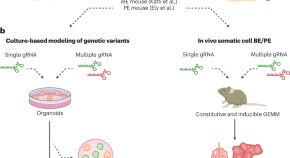
Cancer variant modeling in vivo
Prime- and base-editor mouse models enable finely tuned, efficient functional studies of cancer-associated genetic changes.
- Sean Porazinski
- Marina Pajic
First in vivo base editing lowers cholesterol
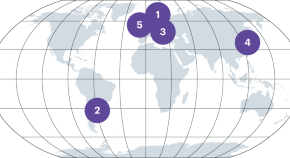
Biotech news from around the world
Yeast with a half-synthetic genome, metagenomics.
Recent patents relating to methods of characterizing metagenomic samples and analyzing and processing metagenomic data.
Chikungunya vaccine approved
A neuroprosthesis for parkinson’s disease.
- Anahita Bishop
Wireless multisite physiological sensor with clinical-grade accuracy

Bioengineered spider silk without critters
New tools are enabling companies to develop genetically engineered spider silk fibers that are as tough as steel, and as elastic as rubber.
- Kenna Hughes-Castleberry

Recent moves of note in and around the biotech and pharma industries.
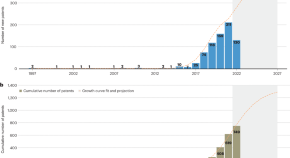
The global patent landscape of artificial intelligence applications for cancer
A review of the emerging patent landscape can assist key actors in making informed strategic decisions about AI applications in oncology.
- Luiza Braga
- Renato Lopes
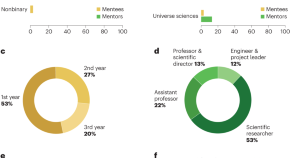
Collectively building a mentor–mentee relationship through a one-day workshop
A workshop based on collective intelligence lays the foundations of mentor–mentee interactions by providing tools to build a valuable relationship.
- Julie Foncy
- Marta Kwapisz
- Julie Batut
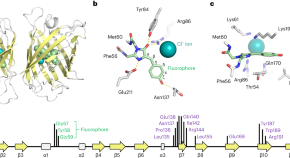
A monomeric StayGold fluorescent protein
The bright, photostable fluorescent protein StayGold is converted into a monomer.
- Esther Ivorra-Molla
- Dipayan Akhuli
- Mohan K. Balasubramanian
From AI to the Y chromosome (and everything in between)
Nature Biotechnology editors pick their favorite research articles from 2023.

Nature Biotechnology ’s academic spinouts 2022
Nature Biotechnology ’s annual survey highlights academic start ups that are, among other things, correcting misfolded or disordered proteins, creating second-generation GPCR agonists, building a new gene delivery platform and mining cancer genomes for novel targets.
- Michael Eisenstein
- Charles Schmidt
- Laura DeFrancesco
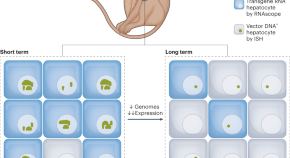
Tracing the fate of AAV vectors in the body
A study of AAV gene therapy in monkeys proposes that integrated vectors may drive long-term transgene expression.
- Nerea Zabaleta
- Irene Gil-Farina
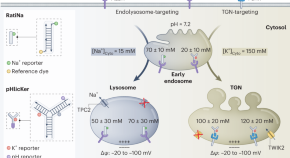
DNA nanodevices map intracellular ions
Two DNA nanodevices, RatiNa and pHlicker, provide precise mapping of sodium levels in acidic organelles and potassium activity at a single-organelle resolution.
Top ten news stories in 2023
Our ranking is out, and it has a few surprises. In pole position — predictably — is Wegovy, the weight-slashing GLP-1 agonist, with AI-hallucinated proteins a close second. These are followed by drugging options for RNA. The dark horses are virus-free gene therapies and a sweet protein.
- Lisa Melton
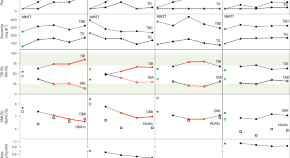
Encapsulated stem cell–derived β cells exert glucose control in patients with type 1 diabetes
β cells derived from stem cells improve blood glucose control in patients with diabetes.
- Bart Keymeulen
- Kaat De Groot
- Daniel Pipeleers
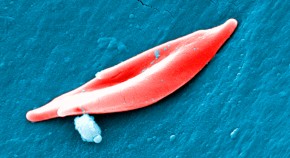
The world’s first CRISPR therapy is approved: who will receive it?
The go-ahead for Vertex’s gene editing therapy in sickle cell disease and β-thalassemia is a historic milestone, but this one-time treatment is costly.
- Cormac Sheridan
Quick links
- Explore articles by subject
- Guide to authors
- Editorial policies
Biomolecular Engineering & Bioinformatics M.S. and Ph.D.
The Department of Biomolecular Engineering offers interdisciplinary M.S. and Ph.D. degrees in biomolecular engineering and bioinformatics and accepts students from a wide-variety of backgrounds. A typical cohort includes incoming students from molecular biology, genetics, computer science, engineering, and mathematics. The unifying theme of our research training program is using quantitative approaches to addressing fundamental questions in biology and biomedical science.
Program coursework is designed to provide the technical skills in programming and other technical skills required for independent and advanced scientific discovery. Incoming students undertake rigorous core coursework, conduct laboratory rotations (Ph.D. only), and are exposed to a rich environment of regular seminars and group meetings. Students interact closely with biomolecular engineering and bioinformatics faculty members while undertaking their dissertation research (Ph.D.) or capstone projects (M.S.), and have first-hand access to state-of-the-art computation tools and laboratory facilities throughout their training, including cluster computing and high-throughput sequencing facilities.
Please refer to the Division of Graduate Studies Admissions website for our current application due date .
Apply to MS Apply to PhD
NOTE: GRE no longer required for Biomolecular Engineering & Bioinformatics MS and PhD applications

The Ph.D. program prepares students to lead independent research programs in academic or industry settings. The PhD program accepts students through the BMEB track of the umbrella Program in Biomedical Sciences and Engineering (PBSE). The program duration is typically five to seven years.
More info>>

The M.S. program is designed to prepare students for careers in contemporary biomedical research settings in the biotechnology industry. The program duration is typically one to two years.
- Candidates pursuing M.Sc. / M.Pharm / M.Tech (during any semester) or B.Pharm / B.Tech / Integrated M.Sc. (from the third year onwards) in any branch of Life Sciences are eligible to apply for this program.
- The plicants should have first class throughout their Academic Career, i.e. 10 th , Intermediate or 12 th and Degree (till the previous semester).
- Distinguished Lectureships
- Degree Programs
Ph.D. in Microbiology
- M.S. in Microbiology
- Master’s of Microbiology (M.M.)
- Master of Microbial Biotechnology (M.M.B.)
- Graduate Minor in Microbiology
- Research Areas
- Research Facilities
- Research Awards
- Microbiomes and Complex Microbial Cluster
- BeeMORE Program
Student Resources
- Microbiology Graduate Student Association
- Adjunct Faculty
- Give Now
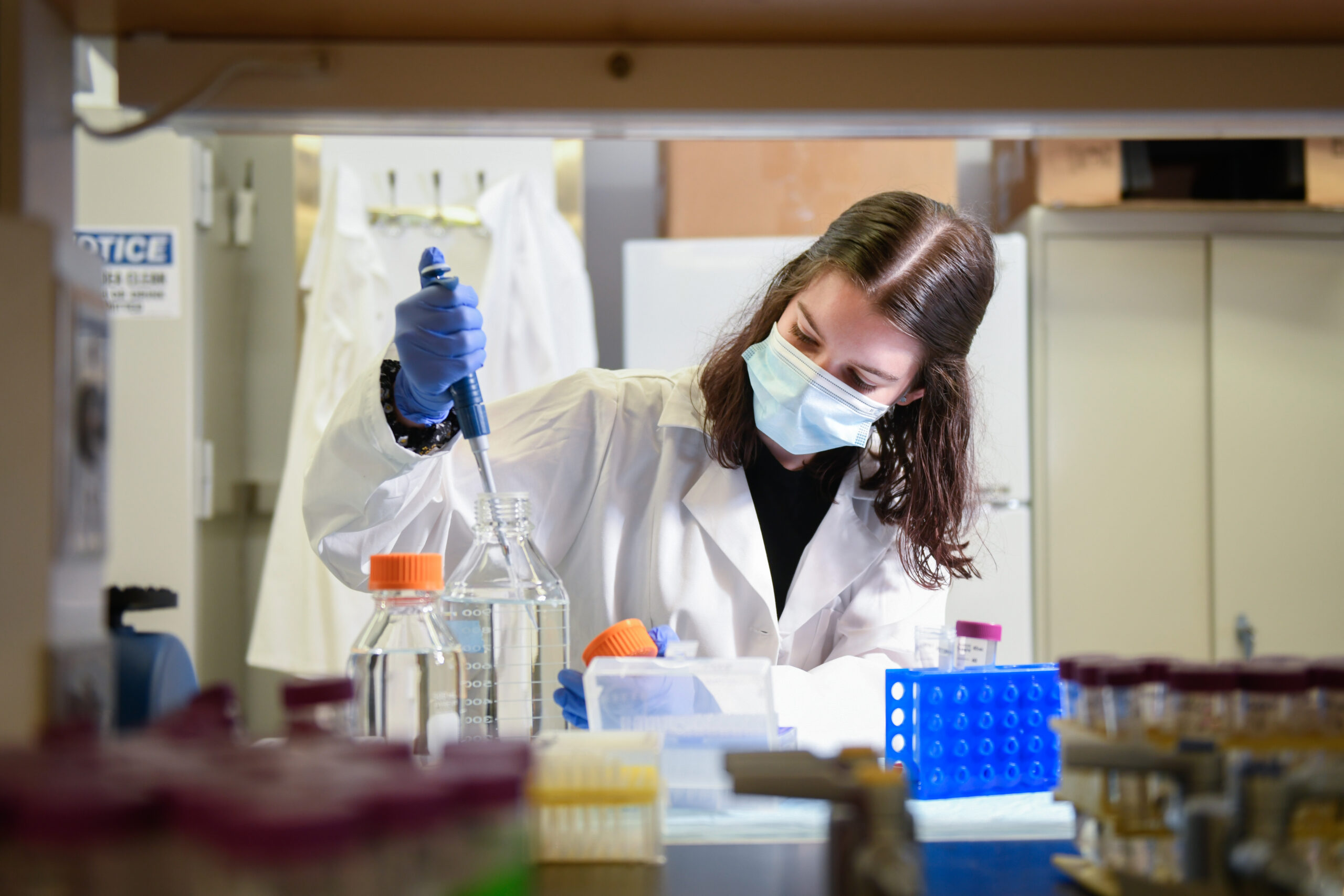
The Doctor of Philosophy (Ph.D.) is the highest degree offered by the Microbiology Graduate Program (MGP). The goal of our doctoral program is to provide students with the foundation necessary to pursue a career in a university, industry or research institute setting.
Students in our doctoral program are trained to recognize significant biological problems, design experimental approaches for solving these problems and communicate their results to the scientific community and the public.
Join the Pack
Review Our Admission Requirements and Apply Now!

The requirements listed below are the minimum requirements to be met by all students in our Ph.D. program. A student’s advisory committee may recommend additional requirements as deemed appropriate, based on a student’s background and research plans.
Curriculum and Courses
The Microbiology Graduate Programs at NC State are interdisciplinary. Our Ph.D. students take many courses taught by MGP faculty, as well as elective courses offered in numerous disciplines and departments across campus, including Biochemistry , Biotechnology , Animal Science , Food Science and Genetics . Our Ph.D. curriculum allows for flexibility Doctoral students will have completed at least 72 credits by the end of their fourth year in the program.
All microbiology graduate students must maintain a minimum cumulative GPA of 3.0. The Graduate Student Support Plan (GSSP; tuition and health benefits) also requires continuous enrollment, meaning all graduate students must enroll for a minimum of nine credits in each Fall and Spring semester to qualify. After the first year, most of these are Research credits.
Required Course Credits for a Ph.D. in Microbiology
Required courses.
As listed above, students are required to register for the following:
MB 500s-700s – Microbiology Courses
Students are required to take 12 graduate-level, letter-graded microbiology (MB) credits. Courses are 3 credits each.
MGP students are able to take courses that focus on the various specialized disciplines of microbiology, including bacterial physiology, environmental microbiology, immunology, molecular genetics and virology. Prior experience can impact which courses a student can enroll in.
Prerequisites in biochemistry are required for many of these courses, so we recommend that all microbiology graduate students have the equivalent of introductory biochemistry ( BCH 553 ) at NC State early in the curriculum.
An example of courses that fit into two of many different microbiology “tracks” or concentrations:
Mb 870 – laboratory research rotations.
Doctoral students supported by a teaching or research assistantship are required to participate in a minimum of two research rotations , allowing them to experience the types of research performed in MGP faculty member’s laboratories and choose a research area of high interest to them. An additional rotation is possible, with approval from the Director of Graduate Programs (DGP) and the respective faculty.
Research rotations take place each year from July through the end of the Fall semester. Students earn 1 credit (MB 870) for both laboratory rotations, and their performance is formally evaluated by the principal investigator of the laboratory. Students must also provide a written or oral report about their rotation experience. Following their last research rotation, students may choose a laboratory for their dissertation research.
Although doctoral students supported by a stipend funded from a faculty grant or other source are not required to participate in the research rotations, they may choose to do so with approval from the principal investigators. We encourage all students to review MGP faculty pages and meet with faculty before deciding upon a specific lab for their rotation.
MB 886 – Teaching Experience
A minimum teaching responsibility is part of the requirements for a Ph.D. degree in Microbiology from NC State. Students must serve as a laboratory teaching assistant for at least one semester in an NCSU on-campus course. Prior teaching experience in an M.S. program will be considered to fulfill this requirement. One credit of MB 886 is provided for each semester the student teaches.
The teaching requirement should be fulfilled at the earliest possible time in the graduate program. Example courses approved for fulfilling the teaching requirement are: MB 352, MB 412, MB 452 and BIO 181. Specific tools for enhancing teaching effectiveness are provided for teaching assistants, including workshops and constructive evaluation by the instructor and the students.
MB 801 – Seminar in Microbiology
The MGP requires all graduate students to attend Microbiology seminars throughout their degree program. All Ph.D. students must register for at least two semesters (two credits) of seminar.
MB 893/895 – Microbiology Research
MB 893 and MB 895 provide credit for research students perform in our Ph.D. program. Students register for MB 893 prior to passing their Preliminary Exam , after which they may sign-up for a variable number of MB 895 credits each semester. A minimum of six credits is required for the Ph.D. degree. However, this is a research-intensive degree, so many credits will end up being for research (MB 895 Microbiology Research).
Other Professional Development
All our graduate students are required to attend either the Microbiology course in Professional Development and Responsible Conduct of Research, or a similar module offered in related programs (BIT, GN, etc.). One credit hour is required.
Elective Graduate Courses
Doctoral students can choose to take other courses offered by departments and programs throughout NC State (Biochemistry, Genetics, Statistics, etc.). Selection of elective courses is done by the student, in consultation with and approval by the advisory committee. Letter graded or satisfactory/unsatisfactory course formats can be used.
Below are examples of elective courses available. The graduate catalog should be consulted for the current comprehensive listing.
- BAE 525 – Industrial Microbiology & Bioprocessing
- BCH 553 – Biochemistry of Gene Expression
- BCH 701 – Macromolecular Structure
- BCH 703 – Macromolecular Synthesis and Regulation
- BCH 705 – Molecular Biology of the Cell
- BIT 510 – Core Technologies in Biotechnology
- BIT 595X – Advanced Modules in Biotechnology
- GN 513 – Advanced Genetics
- GN 701 – Molecular Genetics
- GN 735 – Functional Genomics
- GN 850 – Professionalism and Ethics
- MB(PP) 730 – Fungal Genetics and Physiology
- MB 610 – Special Topics in Microbiology
- MB 620 – Special Problems
- MB 801 – Seminar in Microbiology
- MB 705 – Biological Scanning Electron Microscopy
- MB(IMM) 783 – Advanced Immunology
- MB 790I – Practical Digital Imaging
Advisory Committees
Doctoral students are required to select a dissertation advisor before the end of their second semester (until then, the Director of Graduate Programs (DGP) serves as a temporary advisor). By the end of their first year, each student must also have selected a graduate advisory committee with the help of their dissertation advisor. Advisory committee’s will consist of a student’s dissertation advisor, at least two additional faculty members from the MGP and one faculty member who holds a graduate faculty appointment in another program.
All required committee members must hold appointments within the Graduate School at NC State. Students may select scientists who are not members of the Graduate School faculty (e.g., adjunct faculty, industry scientists) for their committee, but it is in addition to the required members. Graduate advisory committees must meet no less than once a year.
Graduate Plan of Work (PoW)
A Graduate Plan of Work (PoW) will include all courses, a tentative dissertation title and an anticipated timetable for taking each course. Students and their dissertation advisors will informally outline the PoW as soon as possible. The plan will be submitted for approval to and/or amendment by the student’s advisory committee. Then the PoW will be formally submitted to the graduate school by the end of the student’s third semester at NC State.
Visit the Graduate School website for more information about the graduate PoW .
Annual Research Progress Reports
The MGP will facilitate scheduling an annual meeting of the student’s advisory committee, at which the student will make an oral presentation and submit a written report on their laboratory research. A Graduate Student Progress Evaluation Form will be completed by the advisory committee. A satisfactory evaluation will be necessary for the student to receive assistantship support and/or be able to register for the next semester.

Dissertation and Defense
All Ph.D. students must write a dissertation on their research and this must conform to the regulations laid down in the NCSU “Thesis and Dissertation Guide.” The content and structure of the dissertation must be approved by the advisory committee, and all degree candidates are expected to prepare their research results for publication prior to completing their program. Doctoral candidates who have completed their research and other degree requirements (72 credit hours) may enroll in MB 899 (Dissertation Preparation) while they are writing their dissertation. All Ph.D. candidates must also present a seminar hosted by the MGP prior to defending their dissertation. Subject to the satisfactory defense of the Ph.D. dissertation, the advisory committee will approve it for transmittal to the Graduate School.
Course Catalog
Explore our course offerings and microbiology course descriptions
Review our admission requirements and apply now!
Discover some of the helpful resources available to MGP students
Fill out our interest form and we will be in touch!

[100+] Biotechnology Research Topics With Free [Thesis Pdf] 2023
Are You Searching Research Topics For Biotechnology , Topics For Biotechnology Research Paper, Biotechnology Research Topics For Students, Research Topics Ideas For Biotechnology, Biotechnology Research Topics For PhD, Biotechnology PhD Topics. So You are in right place.
In this article, we provide you latest research topics for Biotechnology with a full Phd thesis. By these research topics for Biotechnology you can get idea for your research work. On this website, you can get lots of Biotechnology Research Topics for College Students, PhD, Mphil, Dissertations, Thesis, Project, Presentation, Seminar or Workshop. Check the suggestions below that can help you choose the right research topics for Biotechnology: You can also Free Download Biotechnology Research PhD Thesis in Pdf by the given link.
Now Check 100+ Biotechnology Research Topics List
Table of Contents
Research Topic For Biotechnology 2023
Biotechnology research topics for dissertation, research topics ideas for biotechnology, biotechnology research topics ideas for college students, topics for biotechnology research paper, biotechnology research topics for thesis, biotechnology research topics for students, biotechnology research topics for undergraduate students, biotechnology research topics for university students, biotechnology research topics for phd, research topics for phd in biotechnology, research topics for mphil biotechnology, biotechnology phd topics, research paper topics for biotechnology, biotechnology research paper topics, phd thesis topic for biotechnology, research topics for biotechnology subject, biotechnology research topics for fisheries, research topics for biotechnology, biotechnology research topics examples.
Note: All Research Work Idea on this website is inspired by Shodhganga: a reservoir of Indian Theses. We provide you mostly research work under Creative Commons Licence. Credit goes to https://shodhganga.inflibnet.ac.in/
If you find any copyright content on this website and you have any objection than plz immediately connect us on [email protected]. We Will remove that content as soon as.
This Post is also helpful for: Biotechnology Thesis Pdf, Biotechnology Thesis Topics, Biotechnology Dissertation Topics, Biotechnology Thesis, Catchy Title For Biotechnology, Phd Thesis Topic for Biotechnology, Biotechnology Research Paper Topics, Biotechnology Phd Topics, Biotechnology Research Topics, Research Topics For Biotechnology Students in India, Biotechnology Research Topics For College Students.
11 thoughts on “[100+] Biotechnology Research Topics With Free [Thesis Pdf] 2023”
- Pingback: Home - Research Scholar
- Pingback: Home Page 3 - Research Scholar
- Pingback: How To Write Master Thesis Pdf: Step By Step Example and Quickly Tips - Research Scholar
- Pingback: How To Do Research in Philosophy 2023 - Research Scholar
- Pingback: How To Do Research in History 2023 - Research Scholar
- Pingback: How To Do Research in Life Science 2023 - Research Scholar
- Pingback: How To Do Research in Education 2023 - Research Scholar
- Pingback: How To Do Research in Management 2023 - Research Scholar
- Pingback: How To Do Research in Commerce 2023 - Research Scholar
- Pingback: How To Do Research in Botany 2023 - Research Scholar
- Pingback: How To Do Research in Microbiology 2023 - Research Scholar
Leave a Comment Cancel reply
Save my name, email, and website in this browser for the next time I comment.
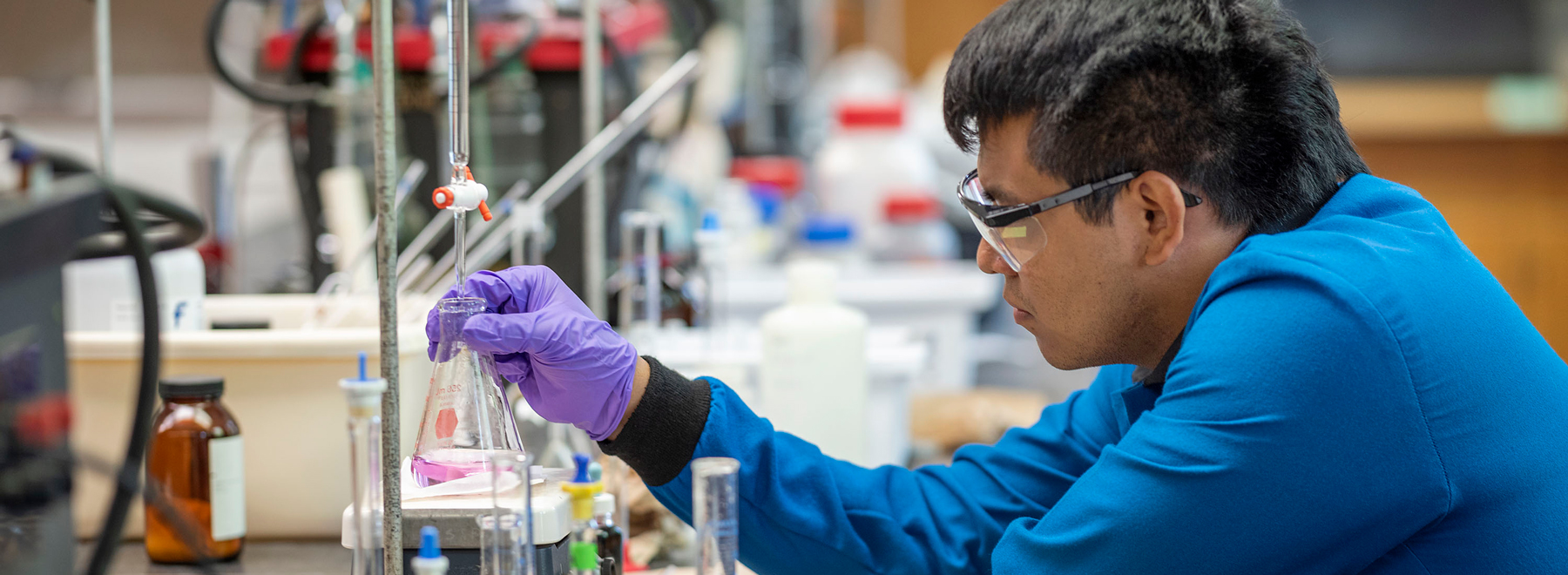
Biotechnology improves our lives and our planet. It’s used to develop technologies and products such as biofuel, medicine and vaccines. CSUBIOTECH is a committed network of faculty, deans and presidents representing the CSU’s 23 campuses. Together, their work champions biotechnology innovation and helps students embark on life science careers through experiential learning opportunities.
CSUBIOTECH is dedicated to developing a diverse and professional biotechnology workforce for California and the global economy.
Grant & Award Programs
Explore multiple opportunities for CSU biotechnology faculty and students.
See Open Program Calls
Grant Administration
Get answers to your questions and find out the status of your grant.
Post Award Grant Management
Grants Database
Easily search grants and awards managed by CSUBIOTECH since it started in 1999.
Explore Projects

CSUBIOTECH has supported CSU faculty and students with more than $16 million grants and awards, creating opportunity and change. *CSUBIOTECH reporting as of July, 2022
Every year, nearly 100 CSU faculty members, deans, and presidents at the 23 CSU campuses collaborate to carry out the work of CSUBIOTECH.
CSUBIOTECH TV Channel
Access our library of video resources, including presentations from webinars, conferences, and CSUBIOTECH events.
CSU Biotechnology Symposium
Join over 600 participants as you broaden your knowledge of the latest biotechnologies and innovations and tap into the abundant career opportunities available to you.
Annual Reports
See CSUBIOTECH in action and learn how its work is transformative for students and faculty in biotechnology.
News & Announcements
Read about CSUBIOTECH grant announcements and news in the biotechnology community.
CSUBIOTECH Newsletter
Our monthly newsletter includes updates and opinions on biotech education, entrepreneurship, research and workforce development.
CSUBIOTECH San Diego State University 550 Campanile Drive, San Diego, CA 92182 (619) 594-2822
- Executive Director
- Governing Body
- Scientific Advisers
- Infrastructure
- Research Area
- Collaboration
- Summer Training
- Contact for Training
- Show Timings
- Now Showing
- Availability
- Booking Process
- Service Charges
- Terms & Conditions
- Recent Events
- Testimonials
- Picture Gallery
- BTIS-sub DIC
- Research Activities
- Bioinfo Metaserver
- Important Links

Select Option : English हिन्दी

Useful Links
- Research Focus
- Senior Demonstrator
- Lab Services
- Other Services/Facilities
- Achievements
- Student Details
- Image Gallery
Latest Updates

Presently, the Department is headed by Dr. Anushree Gupta. The Department is known for its commitment to biomedical research and continuous efforts of the Faculty has established a name for the Department in the areas of Leprosy, TB, Malaria and Cancer. New fields of research initiated in the Department include Cardiogenomics, Bioinformatics, Osteoimmunology, Molecular Biology, Virology and Autoimmunity. The Departmental Faculty have published more than 500 research articles/chapters in journals/books of national and international repute and hold more than a dozen patents. For their research contributions, they have been recognized by various International and National Awards, Prizes and Fellowships from several Science and Medical Academies. The research projects in the Department are funded by various agencies of the Govt. of India, such as DBT, ICMR, DST, CSIR, UGC, intramural support as well as International funding agencies like CNRS, Bill and Melinda Gates Foundation,etc. with several Ph.D. students/Project fellows working on research topics in the afore mentioned areas. The Department regularly invites eminent scientists and academicians to deliver seminars on current topics of international and national importance to apprise the students and Faculty members of Institute on recent advances related to the field of Biotechnology.
- Dr. Anushree Gupta
- Dr. Sirish Kumar Ippagunta
- Dr. Rupesh K. Srivastava
- Dr. Vikram Saini
- Dr. Bhupendra Kumar Verma
- Dr. Sumit Rathore
- Dr. Vineet Choudhary
- Dr. Mahendra Seervi
- Dr. Avtar Singh Meena
- Dr. Shrabani Saugandhika
- See us on facebook
- See us on twitter
- See us on youtube
- See us on linkedin
- See us on instagram
New incubator to fuel life science innovation in Stanford Research Park
A recently vacated building in Stanford Research Park will be the future home of a new life science incubator and lab suites. Located near campus, this incubator will serve as an anchor for a preeminent life science district.
September 17, 2019 - By Amy Adams

The 92,000 square foot building at 3160 Porter Dr will be developed into a life science incubator and small lab suites. Vantage Point Photography Inc.
To bolster the long-term vision of a thriving bioscience community near its campus, Stanford University is working to shape part of Stanford Research Park into a leading life science district focused on fast-growing sectors such as bioengineering, gene therapies, diagnostics, medical technology and devices, surgical robotics and digital health. As a key component of this effort, Stanford is collaborating with Alexandria Real Estate Equities, Inc. to convert an existing 92,000-square-foot facility at 3160 Porter Drive into a life science incubator — Alexandria LaunchLabs® at Stanford Research Park — and small lab suites.
When the building was recently vacated, Stanford saw an opportunity to create a flexible and vibrant space that would enhance the connections between the existing life science ecosystem of medical facilities, researchers and companies in the surrounding area, while also encouraging progress toward an even more diverse life science community. The university held a competition for firms that specialize in this work and chose Alexandria, an experienced developer and operator of successful life science communities near academic campuses.
“Stanford has a legacy of translating life science research discoveries into cures, but the opportunities in this field are greater than ever before. We want to take advantage of this current momentum and further accelerate solutions,” said Stanford President Marc Tessier-Lavigne , PhD. “This new incubator will support entrepreneurs in the development of new therapies and cures for critical diseases and create a community for life sciences entrepreneurship and innovation. We were delighted to enlist Alexandria, which has a strong history of not only building lab space but stimulating discovery and collaboration through their unique approach to creating life science ecosystems.”
The university envisions the incubator as the anchor of an 85-acre life science district, within the existing Stanford Research Park, that will become a new center of gravity for life science innovation in the Bay Area — a community for scientists and entrepreneurs who desire to collaborate, discover and invent pioneering medicines, therapies, devices and technologies to help humankind.
Accelerating therapies
Positioned roughly a mile from campus and in close proximity to Stanford’s adult and children’s hospitals, the VA hospital, and Stanford University School of Medicine, as well as Jazz Pharmaceuticals, Varian Medical Systems, Kodiak Sciences, the Canary Foundation and other biotech firms, Alexandria LaunchLabs at Stanford Research Park will catalyze emerging life science research. It also aligns with the goals of the Innovative Medicines Accelerator — an initiative that arose out of Stanford’s long-range planning process, which aims to help basic and applied researchers from across the schools of Medicine, Engineering and Humanities & Sciences translate their research discoveries into new therapies and diagnostics.
“This space will be key to our shared vision of ensuring Stanford discoveries continue to benefit the world,” said Sanjiv Sam Gambhir , MD, PhD, Virginia and D.K. Ludwig Professor of Cancer Research and chair of the Department of Radiology. “Together with the Innovative Medicines Accelerator, the hope is the incubator can do even more to initiate commercialization of novel therapies for the greater good of humanity.”
Having an expanded life science-focused community close to campus will also complement existing efforts within the School of Medicine to translate basic science discoveries into new therapies.
“The breadth and depth of innovative research emerging from Stanford Medicine is astonishing,” said Lloyd Minor , MD, dean of the Stanford School of Medicine. “The incubator will provide our researchers with resources and access to experts to streamline and speed the translation of groundbreaking discoveries. Additionally, its close proximity to Stanford’s School of Medicine, two world-class hospitals, and the VA will help to realize the promise of bench-to-bedside research.”
As new technologies, devices, treatments and therapies move from ideas to labs to applications in the real world, it is important to have spaces that can adapt to support this development — and early-stage life science solutions have diverse needs. Such flexible spaces can be challenging to find in the Bay Area and companies often end up renting space that is longer-term than what they require. Spots close to the Stanford campus, and the venture capital groups nearby, are especially rare.
“Biotech entrepreneurs often need to commit to multiyear leases, large footprints and expensive lab build-outs when they aren’t even sure they have a viable product yet,” said Jennifer Cochran , PhD, Shriram chair of bioengineering at Stanford. “This flexibility and proximity to campus will greatly benefit Stanford faculty and other entrepreneurs, and provide them with a supportive community and shared resources to facilitate their new ventures.”
Bridging academia and industry
Since its origin in the 1950s, Stanford Research Park has drawn pioneering researchers and industry leaders, in part, due to the potential for collaboration with the university nearby. The 700-acre research park is home to about 150 diverse companies focused on scientific discovery, technological innovation and commercialization of groundbreaking research. It also includes existing biotechnology companies and School of Medicine lab space focused on precision medicine.
Under this new agreement, Stanford has sold a 51-year ground lease for 3160 Porter Drive to Alexandria. Building upon the success of Alexandria’s unique space offerings for life science companies near academic campuses, the company will bring its Alexandria LaunchLabs platform to Stanford Research Park to create an environment that stimulates discovery. Alexandria LaunchLabs at Stanford Research Park will provide flexible, move-in-ready lab and office space, as well as strategic programming and access to seed capital. The facility will also offer lab suites for maturing companies.
“As a University-affiliated research park, we recognize we have a unique mission — to bridge academia and industry in an effort to launch solutions that will have an enduring positive impact in our community and world,” said Tiffany Griego, managing director of asset management for Stanford Research Park. “Stanford Research Park and Palo Alto have always been at the forefront of new technological and scientific discoveries and inventions. With a renewed focus on drawing life science entrepreneurs to Stanford Research Park, we will support them in their pursuits to deliver therapies and solutions to the public health challenges of the 21st century.”
Griego said Alexandria LaunchLabs at Stanford Research Park is expected to open in spring of 2021.

About Stanford Medicine
Stanford Medicine is an integrated academic health system comprising the Stanford School of Medicine and adult and pediatric health care delivery systems. Together, they harness the full potential of biomedicine through collaborative research, education and clinical care for patients. For more information, please visit med.stanford.edu .
Artificial intelligence
Exploring ways AI is applied to health care


राष्ट्रीय पशु जैव प्रौद्योगिकी संस्थान
National Institute of Animal Biotechnology
An Autonomous Institute of the Department of Biotechnology, Ministry of Science and Technology, Government of India

NIAB is aimed to harness novel and emerging biotechnologies and take up research in the cutting edge areas for improving animal health and productivity. The Institute’s focus of research will be on Animal Genetics and Genomics, Transgenic Technology, Reproductive Biotechnology, Infectious Diseases, Bioinformatics and Nutrition Enrichment. The institute aims at translational research leading to the development of novel vaccines, diagnostics and improved therapeutic molecules for farm animals. The Institute plans to promote bio entrepreneurship by providing support environment for commercial tenants involved in the development of farm animal based products
Dr. G. Taru Sharma

Publications
Students desk, digital niab, recruitment, important links, campus life.
© National Institute of Animal Biotechnology (NIAB)
Made with ❤ by NIAB
Director's Message
The College
- Mission, Vision & History
- Offices and Services
- Administration
- City College and CUNY Policies
- Campus Map & Directions
- Land Acknowledgement
- CCNY in the News
- Shuttle Bus Service
- Schedule a Tour
Schools & Divisions
- The Bernard and Anne Spitzer School of Architecture
- CUNY School of Medicine
- Colin Powell School for Civic and Global Leadership
- School of Education
- The Grove School of Engineering
- Division of Humanities and the Arts
- Division of Interdisciplinary Studies at Center for Worker Education (CWE)
- Division of Science
Lifetime & Experiential Learning
- Graduate Studies Overview
- Continuing & Professional Studies
- International Studies & Study Abroad
Academic Planning
- Areas of Study
- General Education Curriculum
- Academic Calendar
- Courses / Bulletins
- Academic Affairs
Information For
- Admissions Overview
- Freshman Students
- Transfer/Second Degree Students
- Graduate Students
- Returning to College
- Visiting Students/Non-Degree
- Continuing Education
- Explore CCNY
- ACE Program
- MyCity VIP Portal
Visit Our Campus
- Campus Tours
- Information Sessions
Related Links
- Financial Aid
- Tuition and Fees
- Campus Housing
- International Students
- Honors Programs
- Research Overview
- The Office of Research
- Research Compliance & Ethics
- College Research Council
Discoveries in Actions
- Centers and Institutes
- QC-ALERT Programs
- Undergraduate Research
Faculty & Staff Experts
- By Area of Expertise
- View All Faculty & Staff
Campus Life
- Student Life
- Student Housing
- Benny's Campus Store
Student Services
- Student Affairs
- Health & Wellness
- The AccessAbility Center/Student Disability Services
- Safety Services
- LGBTQ+ Student Center
- CCNY Navigate
- Immigrant Student Resource and Research Center
Support CCNY
- How to Make a Gift
- CCNY Giving: Make-A-Will
- Types of Gifts
- 2023-2024 NYS Charitable Tax Contributions Credit
CUNY Related Links
- CUNY Portal
- Loaner Devices
- Discrimination and Retaliation Reporting Portal
Faculty & Staff
- Faculty / Staff E-Mail (Legacy - Webmail)
- Faculty / Staff E-Mail (New Outlook 365)
- Password Reset
- Content Editor
- Grants Management System
- Visual Course Roster
- Work Orders
- Employee Timesheets
- Student E-Mail
- Degreeworks / FACTS
- City Central
Advanced Study/Thesis Research Form
Anyone wishing to register for Master's level Biology or Biotechnology Thesis Research or Advanced Study, needs to complete this form and send it to [email protected] and copy their mentor, who agrees to oversee their research (before turning in the form).
Requester: Chrisine Stefano Email: [email protected] Phone: 212-650-6800
Last Updated: 04/23/2024 10:44

(Your Own Biotechnology Corner)
PG dissertation at NCCS, Pune – Apply now
NATIONAL CENTRE FOR CELL SCIENCE, An Autonomous Institute of Department of Biotechnology, Ministry of Science & Technology, Govt. of India is inviting applications for the post-graduate dissertation program starting from January 2024. The detailed notification is as below:-
POST GRADUATE DISSERTATION January 2024 Session for 6 or 12 Months Last date for receipt of online applications: November 15, 2023
NCCS invites applications from eligible candidates for the post-graduate dissertation program, commencing in January 2024. Eligible applicants, who are bonafide PG students with a consistently strong academic record and a commitment to pursuing studies in modern biology such as Cell & Molecular Biology, Structural Biology, Bioinformatics, Systems Biology, Neuroscience, Immunology, Infection Biology, Cancer Biology and Microbial Ecology are encouraged to apply.

NCCS will admit dissertation students in four sessions annually, allowing applicants to apply year-round. For those looking to commence their dissertation after April 1, 2024, please apply during the next session. The application process for the April 2024 session will begin in December 2023.
ELIGIBILITY:
- Students who are currently pursuing their first year of M. Sc., M. Pharm, M. Tech programs, OR students in their fourth year of B. Tech, B. Pharm, B. Sc. or integrated M. Sc.
- Applicants with qualifications such as MBBS, MD, B. V. Sc, or M. V. Sc. who have a keen interest in translational clinical research.
Applicants who have already completed or expected to complete their post-graduation before the training session ends are ineligible to apply. However, this does not apply to MBBS, MD, B.V. Sc, or M. V. Sc degree holders. Please note that meeting the essential eligibility criteria does not guarantee shortlisting or subsequent selection for the PG dissertation at NCCS.
SCHEDULE: JAN 2024 SESSION Commencement of Online Application Submission October 26, 2023 Deadline for Online Application Submission November 15, 2023 Announcement of Selected Candidates November 30, 2023 Commencement of Dissertation January 01 to March 31, 2024
READ COMPLETE NOTIFICATION
Leave a Comment Cancel Reply
Your email address will not be published. Required fields are marked *
Save my name, email, and website in this browser for the next time I comment.
- Jobs 👨🔬
- Career Advice 👧🏻
- Scholarship 🎓
- Admission 🎟️
- Exams 📘
- Biotech Internships & Projects 🏴
- Research Proposals ✍️
- Awards 🏆
- Events 🌏
- Workshop 👩⚕️
- Promote & Earn
- Teach & Earn
- BioTecNika Global
- 💰 Earn from BioTecNika
- 👩🚀 Work @ BioTecNika
- 📜 Advertise With us
- 🤙 Contact Us
- 👬 About Us

UGC’s Big Announcement: No Score Normalization in NET & CUET-UG From…

Nirma University Makes Groundbreaking Breakthrough With Patent For Chimeric Interleukin 15…

Latest News : Now Bachelor’s Degree Holders Can Get Direct Admission…

India’s First Home-grown Gene Therapy For Cancer Launched By President of…

Dr. Reddy’s Laboratories’ Aurigene Launches Groundbreaking AI/ML Drug Discovery Platform!

Subject-Wise Approach For NEET Exam – Expert Strategies Discussed

10 Easy Tips To Qualify NEET 2023 Exam

List of Best Reference Books To Crack NEET Exam + Preparation…

How To Crack NEET 2023 Exam In First Attempt – Top…

NEET UG 2022 Question Paper Discussion By Biotecnika NEET

Clini India Offering Advance Program in Clinical Research & Management (APCRM)…

100 Days – 100 Important Topics To Study For CSIR NET…

ISRO IN-SPACe Offering Course in Space Life sciences Technology. Apply Now!

Unlocking the Power of R Programming for Biologists – A LIVE…

Clinical Research & Development Certificate Course By Bangalore Bioinnovation Centre &…

35 Days To Success in CSIR NET – An Exclusive CSIR…

45 Days To Success in CSIR NET – An Exclusive CSIR…

49 Days To Success in CSIR NET – An Exclusive CSIR…

56 Days To Success in CSIR NET – An Exclusive CSIR…

57 Days To Success in CSIR NET – An Exclusive CSIR…

Biotecnika Times Newsletter 31.01.2023 DBT-RA Programme, TIFR Summer Research With Stipend

Biotecnika Times Newsletter 01.12.2022 RCB PhD Admission 2022, Coca Cola Job

Biotecnika Times Newsletter CIAB, IGIB Jobs, CSIR NET Final Ans Key,…

CSIR NET LIFE Science & GATE Biotech Syllabus Comparison

Genetics career Scope and Opportunities
- Biotech Admissions
- Biotech Internships & Projects
NCCS Pune Post Graduate Dissertation January 2024 Session – Applications Open
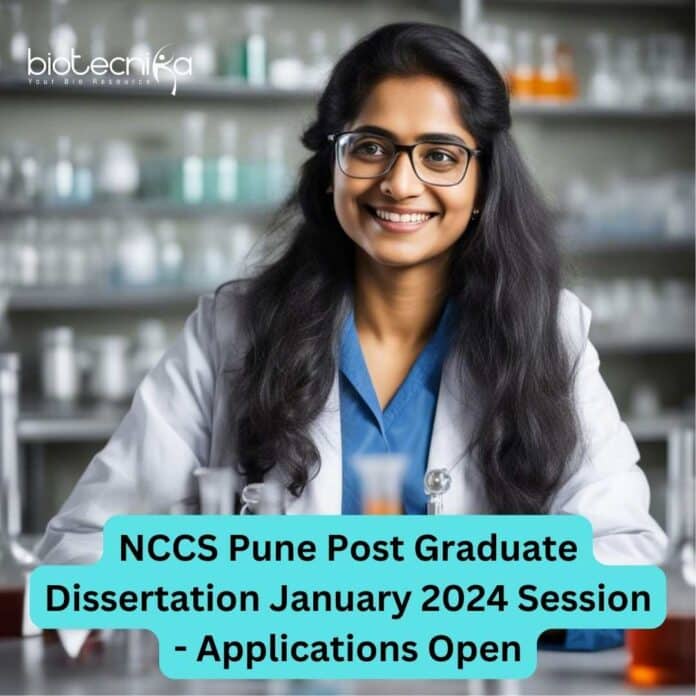
NCCS Post Graduate Dissertation 2024 January Session – Apply Online
NCCS Post Graduate Dissertation 2024 January Session – Apply Online. Interested and eligible applicants can check out all of the details on the same below:
NATIONAL CENTRE FOR CELL SCIENCE राष्ट्रीय कोशिका शिज्ञान कें द्र
An Autonomous Institute of Department of Biotechnology, Ministry of Science & Technology, Govt. of India
NCCS Complex, Savitribai Phule Pune University Campus, Ganeshkhind, Pune 411 007
POST GRADUATE DISSERTATION January 2024 Session for 6 or 12 Months
Last date for receipt of online applications: November 15, 2023
NCCS invites applications from eligible candidates for the post-graduate dissertation program, commencing in January 2024. Eligible applicants, who are bonafide PG students with a consistently strong academic record and a commitment to pursuing studies in modern biology such as Cell & Molecular Biology, Structural Biology, Bioinformatics, Systems Biology, Neuroscience, Immunology, Infection Biology, Cancer Biology and Microbial Ecology are encouraged to apply.
NCCS will admit dissertation students in four sessions annually, allowing applicants to apply year-round. For those looking to commence their dissertation after April 1, 2024, please apply during the next session. The application process for the April 2024 session will begin in December 2023.
ELIGIBILITY:
- Students who are currently pursuing their first year of M. Sc., M. Pharm, M. Tech programs, OR students in their fourth year of B. Tech, B. Pharm, B. Sc. or integrated M. Sc.
- Applicants with qualifications such as MBBS, MD, B. V. Sc, or M. V. Sc. who have a keen interest in translational clinical research.
Applicants who have already completed or expected to complete their post-graduation before the training session ends are ineligible to apply . However, this does not apply to MBBS, MD, B.V. Sc, or M. V. Sc degree holders. Please note that meeting the essential eligibility criteria does not guarantee shortlisting or subsequent selection for the PG dissertation at NCCS.
- To submit your online application form, visit the ‘Project Positions’ section under the ‘Careers’ menu on the NCCS website. You need to have a Gmail account to fill in the online form.
- Please upload the following documents as a single PDF file. This two-page PDF should not exceed 1 MB in size. o The cumulative mark sheet of your Bachelor’s degree OR, for four-year programs, the cumulative mark sheet for the third year. o A certificate from the Head of the Department/ Principal of your College/ University, or Institute using the provided format in ‘Annexure A’ (Page 3). Please print out ‘Annexure A’ on official letterhead- without making any changes in the format, fill it out, add a photograph, have it duly signed, stamped, and scanned before you upload it. o Applications missing either of these attachments will not be considered for selection. It’s important to note that this requirement doesn’t apply to candidates with MBBS, MD, M. V. Sc., or B. V. Sc. qualifications. o Please bring the original HOD certificate and the B. Sc. marksheet at the time of joining.
- NCCS does not offer any stipend and does not impose any fees for the PG dissertation program.
- The PG dissertation program is a full-time commitment. On-campus hostel accommodation may be provided to a limited number of students on a chargeable, firstcome, first-served basis.
- NCCS does not accept applications for part-time dissertations from any students as the PG dissertation program is a full-time training program. Selected students are required to complete a minimum of 5 or 10 months of dissertation, and completion certificates will be issued only upon fulfillment of this requirement.
- Enrolled students are expected to rigorously adhere to all rules and regulations established by the NCCS throughout the duration of their dissertation. Regular attendance at given work place, scheduled lab activities, and any other academic events, is typically required.
- If you experience any technical difficulties during the online application process, please email us at [email protected] . All subsequent updates and information related to this process will be exclusively posted on https://www.nccs.res.in periodically.
SCHEDULE: JAN 2024 SESSION
APPLY ONLINE HERE
Click here for the notification and Download the annexure here
Editor’s Note : NCCS Post Graduate Dissertation 2024 January Session – Apply Online. Please ensure you are subscribed to the Biotecnika Times Newsletter and our YouTube channel to be notified of the latest industry news. Follow us on social media like Twitter , Telegram , Facebook and Instagram .
RELATED ARTICLES MORE FROM AUTHOR

Hershey’s Food Tech & Microbiology Quality Assurance Job Opening – Apply Online

University of Delhi Vice Chancellor Internship Scheme: Summer Internship 2024 With Rs. 10,000 pm Stipend – Apply Now!

International Conference on “Intracellular Quality and Metabolic Control from E. Coli to HomoSapiens” at MIRM-MAHE Bangalore, Registrations Open!
Jeet research program 2024 – call for applications – register online, 2nd edition uk-india toefl scholarship – win scholarship worth rs. 2.5 lakhs*, wise-scope fellowship program by dst – opportunity for women scientists & technologists.
- Privacy Policy
- Terms of Service
- Advertise on BioTecNika
The curated list of the most valuable private companies in the world | Learn More

As Americans Spend More Out Of Pocket On Healthcare, Startups See Opportunity

Americans are spending ever-rising sums of their own money on healthcare.
So-called out-of-pocket expenses now top $470 billion annually, per the federal government’s latest accounting . Spending is expected to keep rising too, along with the spread of high-deductible health plans and care providers who don’t accept insurance.
While consumers aren’t exactly thrilled about this trend, startup founders and their backers see some very scalable opportunities. In the past couple of years, hundreds of millions of dollars have gone to companies working on things like health savings account platforms, care price comparison apps, and tools for employers offering high deductible plans.
Who’s getting funded? Using Crunchbase data , we curated a sample list of 19 companies innovating around the rise of out-of-pocket health spending. Collectively, they’ve raised more than a half-billion dollars to date.
Looking at the list above, we see that much of the funding activity skews early-stage. There’s likely potential for exponential growth ahead, however, given the vast sums at play coupled with the seemingly low bar for improving on the status quo.
As sector heavyweight Andreessen Horowitz put it in an explainer piece on its investment thesis: “Why are we so bullish on consumer health? The current state of affairs is dismal. Patients are unhappy; providers are burned out.”
The firm’s investment strategy rests on the notion that as consumers are footing more healthcare costs, they’re becoming more discerning about healthcare experiences and thus “likely to vote with their wallets.”
Key themes: Access, price transparency, alternative plans
It’s also worth noting that more consumers have wallets with which to vote. As of 2022, more than half of private-sector workers (53.6%) were enrolled in high deductible health plans, according to a recent study . Enrollees also commonly use health savings accounts or flexible spending accounts to cover day-to-day medical expenses.
Per Colin Tobias , a partner at SemperVirens Venture Capital , a lot of recent startup investment centers around making it easier to use HSAs and manage self-pay transactions. One he points to in this arena is San Francisco-based PayZen , which offers consumers payment plans for health expenses. Another is First Dollar , which develops tools to consolidate benefits in one digital wallet.
Others are working on tools to help healthcare consumers find the best value for their money. Among the more heavily funded startups taking this approach is Turquoise Health , which lets consumers compare prices for medical procedures from providers in their area. The San Diego company secured $30 million in Series B financing in January, bringing total funding to date to over $55 million.
Probably the most recent funding recipient on the price transparency front, meanwhile, is Milu Health . The Illinois startup picked up a $4.8 million seed round last month to build out technology that analyzes health records seeking ways to save on and improve care.
Employers and ICHRAs
The healthcare industry is famous for minting acronyms, which brings us to our next popular investment theme: ICHRAs, or Individual Coverage Health Reimbursement Arrangements.
This is acronym-ese for employers who, rather than offer their own health insurance plan, provide money to employees who can use it to pay for their own policies or cover out-of-pocket medical expenses. ICHRAs are increasingly popular with employers, and startups are looking to tap into some of that growth.
Several of these startups have raised funding pretty recently. Berkeley, California-based Venteur , which offers AI-enabled tools for finding the best use of ICHRA money, picked up $7.6 million in an August seed financing. Thatch , which offers tools for selecting suitable coverage and debit cards for health expenses, landed $6 million last year. StretchDollar , which markets to small businesses extending ICHRAs to employees, closed on a $1.6 million pre-seed round in September.
Getting to better
Overall, as much as most of us hate paying out of pocket for health expenses, especially when we already pay hefty sums for insurance, there are some encouraging takeaways from recent trendlines.
One is that employers are getting more tools to make contributions and help employees navigate coverage in a world of high deductibles and higher out-of-pocket spending. In addition to contributing to policy costs, employers can also fund FSAs to cover self-pay expenses.
Another is that, if AI-enabled tools perform well and providers make price transparency a priority, startups could help mitigate one of the biggest complaints about self-pay care, which is anxiety around price. Before opening our wallets, consumers would greatly appreciate the ability to know from the start what a consultation, test or procedure is going to cost.
Related Crunchbase Pro list:
- Funded Companies Tied To High-Deductible Insurance And Self-Pay Healthcare
Illustration: Dom Guzman

Stay up to date with recent funding rounds, acquisitions, and more with the Crunchbase Daily.
You may also like

The Mixed State Of Startup Funding In 2024, In 11 Charts
We take a look at the the startup world in early 2024 with 11 charts based on recent Crunchbase data that show the state of investment in the first...

Investors Re-Engage With Gaming Startups
After several slow quarters, funding to companies in the gaming space has picked up a bit this year, driven by a resurgence in early-stage dealmaking...

The Crunchbase Tech Layoffs Tracker

2023 Him For Her And Crunchbase Study Of Gender Diversity On Private Company Boards
![biotechnology dissertation 2023 Illustration of stopwatch - AI [Dom Guzman]](https://news.crunchbase.com/wp-content/uploads/Halftime-AI-1-300x168.jpg)
Should You Invest In AI Startups In 2024? Sure, But Here’s A Piece Of Advice

How A Product Video Can Increase Your Chances Of Raising Pre-Seed Investment

Where Active AI Investor Felicis Is Placing Its Bets
67.1k followers.
Find the right companies, identify the right contacts, and connect with decision-makers with an all-in-one prospecting solution.
Press release
Swiss biotech report 2024 shows sector performing well in 2023 by continuing to embrace international alliances, during 2023, switzerland’s biotech sector again demonstrated considerable agility particularly in commercialization and financing activities to continue to play a key role in driving global healthcare innovation. in addition to record revenues of chf 7.3 billion, the industry raised more than chf 2 billion – a remarkable 50% increase over 2022..
Multidisciplinary professional services organization
- Link copied
Read in German , Read in French
- Record revenues of CHF 7.3 billion (USD 8.1 billion)
- Capital investments increase by more than 50% to CHF 2 billion – CHF 1.4 billion by public companies, CHF 0.6 billion by private companies
- Significant licensing and M&A activity in 2023 – VectivBio, T3, Vertex, Santhera
- R&D investments of publicly traded biotech companies have decreased in line with global markets, whereas privately financed companies were able to increase both R&D investments and liquidity reserves
- Record number of product approvals by Swissmedic, EMA and FDA – including world’s first CRISPR gene editing therapy
- Swiss Biotech Day increases international presence with full launch of Global Village, the partnering platform for international delegations
During 2023, Switzerland’s biotech sector again demonstrated considerable agility particularly in commercialization and financing activities to continue to play a key role in driving global healthcare innovation. In addition to record revenues of CHF 7.3 billion, the industry raised more than CHF 2 billion – a remarkable 50% increase over 2022. This comprised around CHF 1.4 billion collected by public companies, and the remaining CHF 0.6 billion by private companies. Although R&D investments dipped slightly to CHF 2.4 billion, they are still at very high levels. The latest edition of the Swiss Biotech Report launched today by the Swiss Biotech Association, in conjunction with EY and eight other partner organizations, provides an analysis of the 2023 biotech funding as well as other 2023 key ratios and statistics. The 2024 Swiss Biotech Report’s theme of ‘Reliable Partners Beyond Borders’ focuses on the positive impact of Swiss collaborations at all levels of the global life sciences ecosystem – from research & development to manufacturing and regulatory harmonization.
Michael Altorfer, CEO, Swiss Biotech Association, commented: «The World Intellectual Property Organization, WIPO, has placed Switzerland top of the Global Innovation Index for the past 13 consecutive years. The Swiss Biotech Report shows that Swiss biotech companies continue to harness this innovation power to develop effective new products and solutions that address global needs. Around 1.5 billion Swiss francs were dedicated to collaborations all over the world.»
Frederik Schmachtenberg, EY Partner and Global Life Sciences Lead for Financial Accounting Advisory Services, added «Swiss biotech companies attracted more than 2 billion Swiss francs, a more than 50% increase compared to 2022. While public biotech companies seemed to have been at least partially impacted by a dire global market sentiment, privately financed companies have raised a solid CHF 0.6 billion, which even allowed them to increase their overall liquidity reserves, despite record investments in R&D projects.»
Key Findings in the 2024 Swiss Biotech Report
Once again, the Swiss biotech industry generated record revenues of CHF 7.3 billion compared to CHF 6.8 billion in 2022. This was driven by significant collaboration and licensing deals, where Swiss biotech companies often successfully partner with large pharma companies, and product sales boosted by a record number of approvals from Swissmedic, EMA, FDA and other global regulatory authorities, including breakthrough advanced therapies from CRISPR Therapeutics, Santhera Pharmaceuticals, Idorsia, Relief Therapeutics and Basilea.
In a challenging global public market, the main fundraises were achieved by Oculis SA, with a SPAC transaction on NASDAQ and follow-on financing collecting USD 144 million and MoonLake Immunotherapeutics, with CHF 415 million through a follow-on transaction from 2022’s IPO. While the public market sentiment remained dire ever since the end of the Covid pandemic, the private funding environment held up well in 2023. Noema Pharma with CHF 103 million raised, Alentis Therapeutics with CHF 94 million, Rejuveron with CHF 67 million, Nouscom with CHF 65 million, and NewBiologix with CHF 45 million led the way.
2023 also saw significant M&A activity at all levels from early stage to established companies demonstrating the maturity of the Swiss biotech sector. Particularly worth noting are Pierre Fabre Laboratories purchase of Vertical Bio, Ironwood Pharma’s takeover of VectivBio for USD 1 billion and Boehringer Ingelheim’s acquisition of T3 Pharma for an amount of up to CHF 450 million.
The number of FTEs working in Swiss R&D biotech companies remained with over 19,000 people almost unchanged in 2023 compared to 2022. Despite an overall slight decrease in R&D expenses, the private companies’ share continued to grow.
Finally, following the creation of an innovation office in 2022, Swissmedic again looked to foster international collaboration and harmonization by establishing ‘The Access Consortium’ with like-minded medium-sized regulatory authorities, including Australia's Therapeutic Goods Administration (TGA), Health Canada (HC), Singapore's Health Sciences Authority (HSA), and the UK’s Medicines and Healthcare Products Regulatory Agency (MHRA).
Expanding the Global Village and Swiss Biotech Success Stories Awards for outstanding achievements
The Swiss Biotech Report 2024 was launched at the Swiss Biotech Day which is attracting increasing numbers of international delegates. One contributing factor is the Global Village , a platform hosted by the Swiss Biotech Association in partnership Switzerland Global Enterprise to stimulate sustainable worldwide networking and international collaboration in biotech and life sciences. In only its second year, the Global Village has already grown by 70% and featured 17 international delegations.
To recognize outstanding achievements, the Swiss Biotech Association was also presenting the Swiss Biotech Success Stories Awards at this year’s Swiss Biotech Day to the winners Fondation Suisse de Recherche sur les Maladies Musculaires (FSRMM) and Dr. Hans-Peter Strebel.
FSRMM was founded in 1985 by Jacques and Monique Rognon together with two existing patient organizations to promote research on neuromuscular diseases. Since its inception, FSRMM has raised in excess of CHF 30 million and funded more than 200 research projects at Swiss universities and hospitals.
Dr. Hans-Peter Strebel founded Fumapharm AG with three other scientists in 1983. This was the start of more than 40 years of successful research leading to the development of Tecfidera, a disease modifying therapy for relapsing multiple sclerosis which has so far benefitted more than 600,000 patients worldwide.
Media Contact
Swiss Biotech Association Sabine Bamert Head of Communications [email protected] swissbiotech.org/media
The Swiss Biotech Report 2024
The Swiss Biotech Report sheds light on the most important trends, factors and sources of innovation, and summarizes topics and facts on the development of the Swiss biotech industry. This year’s theme is ‘Reliable Partners Beyond Borders’.
The Swiss Biotech Report Steering Committee
Michael Altorfer, Swiss Biotech Association Frederik Schmachtenberg, EY Florian Fisch, Swiss National Science Foundation Fabian Gerber, SIX Jan Lucht, scienceindustries Hans-Peter Meyer, Swiss Academy of Engineering Sciences Christian Moser Nikles, Swiss Federal Institute of Intellectual Property Jörg Schläpfer, Swissmedic Laura Suter-Dick, biotechnet Switzerland Sirpa Tsimal, Switzerland Global Enterprise
Swiss Biotech and the Swiss Biotech Association
Founded in 1998, the Swiss Biotech Association represents the interests of the Swiss biotech industry. To support its members in a competitive market, the association works to secure favorable framework conditions and facilitate access to talents, novel technologies and financial resources. To strengthen and promote the Swiss biotech industry, the Swiss Biotech Association collaborates with numerous partners and life science clusters globally under the brand Swiss Biotech™. For further information visit swissbiotech.org .
About the global EY organization
The global EY organization is a leader in assurance, tax, transaction and advisory services. We leverage our experience, knowledge and services to help build trust and confidence in the capital markets and in economies all over the world. We are ideally equipped for this task — with well-trained employees, strong teams, excellent services and outstanding client relations. Our global purpose is to drive progress and make a difference by building a better working world — for our people, for our clients and for our communities.
The global EY organization refers to all member firms of Ernst & Young Global Limited (EYG). Each EYG member firm is a separate legal entity and has no liability for another such entity’s acts or omissions. Ernst & Young Global Limited, a UK company limited by guarantee, does not provide services to clients. Information about how EY collects and uses personal data and a description of the rights individuals have under data protection legislation are available via ey.com/privacy. For more information about our organization, please visit ey.com.
EY’s organization is represented in Switzerland by Ernst & Young Ltd, Basel, with 10 offices across Switzerland, and in Liechtenstein by Ernst & Young AG, Vaduz. In this publication, “EY” and “we” refer to Ernst & Young Ltd, Basel, a member firm of Ernst & Young Global Limited.
Related news
Media Relations
Connect with us
Our locations
Legal and privacy
Transparency report
Company information
EY refers to the global organization, and may refer to one or more, of the member firms of Ernst & Young Limited, each of which is a separate legal entity. Ernst & Young Limited is a Swiss company with registered seats in Switzerland providing services to clients in Switzerland.
Request for proposal (RFP)
EY | Assurance | Consulting | Strategy and Transactions | Tax
EY is a global leader in assurance, consulting, strategy and transactions, and tax services. The insights and quality services we deliver help build trust and confidence in the capital markets and in economies the world over. We develop outstanding leaders who team to deliver on our promises to all of our stakeholders. In so doing, we play a critical role in building a better working world for our people, for our clients and for our communities.
EY refers to the global organization, and may refer to one or more, of the member firms of Ernst & Young Global Limited, each of which is a separate legal entity. Ernst & Young Global Limited, a UK company limited by guarantee, does not provide services to clients. For more information about our organization, please visit ey.com.
© EYGM Limited. All Rights Reserved.
EYG/OC/FEA no.
This material has been prepared for general informational purposes only and is not intended to be relied upon as accounting, tax, or other professional advice. Please refer to your advisors for specific advice.
Do you have any questions?
Contact us | rfp for switzerland.
Contact us Request for proposal (RFP)

Welcome to EY.com
In addition to cookies that are strictly necessary to operate this website, we use the following types of cookies to improve your experience and our services: Functional cookies to enhance your experience (e.g. remember settings), Performance cookies to measure the website's performance and improve your experience , Advertising/Targeting cookies , which are set by third parties with whom we execute advertising campaigns and allow us to provide you with advertisements relevant to you .
We have detected that you have enabled the Do Not Track setting in your browser; as a result, Advertising/Targeting cookies are automatically disabled.
You may withdraw your consent to cookies at any time once you have entered the website through a link in the privacy policy, which you can find at the bottom of each page on the website.
Review our cookie policy for more information.
Customize cookies
I decline optional cookies
MIT Technology Review
- Newsletters
This creamy vegan cheese was made with AI
Climax Foods and other companies are using machine learning to create convincing replacements for conventional dairy cheese.
- Andrew Rosenblum archive page

As Climax Foods CEO Oliver Zahn serves up a plate of vegan brie, feta, and blue cheese in his offices in Emeryville, California, I’m keeping my expectations modest. Most vegan cheese falls into an edible uncanny valley full of discomforting not-quite-right versions of the real thing. But the brie I taste today is smooth, rich, and velvety—and delicious. I could easily believe it was made from cow’s milk, but it is made entirely from plants. And it couldn’t have come into existence, says Zahn, without the use of machine learning.
Climax Foods is one of several startups, also including Shiru of Alameda, California, and NotCo of Chile, that have used artificial intelligence to design plant-based foods. The companies train algorithms on datasets of ingredients with desirable traits like flavor, scent, or stretchability. Then they use AI to comb troves of data to develop new combinations of those ingredients that perform similarly.
“Traditional ingredient discovery can take years and tens of millions of dollars, and what results are ingredients only incrementally better than the previous generation,” says Shiru CEO Jasmin Hume, who wrote her PhD thesis on protein engineering. “ [Now] we can go from scratch, meaning what nature has to offer; pick out the proteins that will function best; and prototype and test them in about three months.”
Not everyone in the industry is bullish about AI-assisted ingredient discovery. Jonathan McIntyre, a food consultant who formerly headed R&D teams in both beverages and snacks at Pepsi, thinks the technology is “significantly” overhyped as a tool for his field. “AI is only as good as the data you feed it,” he says. And given how jealously food companies guard formulas and proprietary information, he adds, there won’t necessarily be sufficient data to yield productive results. McIntyre has a cautionary tale: during his stint at Pepsi, the company attempted to use IBM’s Watson to create a better soda. “It formulated the worst-tasting thing ever,” he says.
Climax Foods circumvented the data scarcity problem by creating its own training sets to essentially reverse-engineer why cheese tastes so good. “When we started, there was very little data on why an animal product tastes the way it does—animal cheddar, blue, brie, mozzarella—because it is what it is,” says Zahn, who previously headed data science for Google's massive ads business. “There [was] no commercial reason to understand it.”
In the food science lab on the ground floor of the Climax offices, on the site of an old chocolate factory, Zahn shows off some of the instruments his team used to build its data trove. There’s a machine that uses ion chromatography to show the precise balance of different acids after bacterial strains break down lactose. A mass spectrometer acts like an “electronic nose” to reveal which volatile compounds generate our olfactory response to food. A device called a rheometer tracks how a cheese responds to physical deformation; part of our response to cheese is based on how it reacts to slicing or chewing. The cheese data creates target baselines of performance that an AI can try to reach with different combinations of plant ingredients.
Using educated guesswork about which plants might perform well as substitutes, Climax food scientists have created more than 5,000 cheese prototypes in the past four years. With the same lab instruments employed on animal cheese, the Climax team performs an analysis that includes roughly 50 different assays for texture and flavor, generating millions of data points in the process. The AI is trained on these prototypes, and the algorithm then suggests mixtures that might perform even better. The team tries them out and keeps iterating. “You vary all the input knobs, you measure the outputs, and then you try to squeeze the difference between the output and your animal target to be as small as possible,” Zahn says. Including small-scale “micro-prototypes,” he estimates, Climax has analyzed roughly 100,000 plant ingredient combinations.
Tasting and subtly adjusting the ingredient blends in so many prototypes by hand would take several thousand years, Zahn says. But starting from zero in early 2020, he and his AI-aided team were able to formulate their first cheese and bring it to market in April 2023 .
The plant constituents of that product, a vegan blue cheese, are hardly exotic. The top four ingredients are pumpkin seeds, coconut oil, lima beans, and hemp protein powder. And yet Dominique Crenn , a Michelin-starred chef, described it as “soft, buttery, and surprisingly rich—beyond imagination for a vegan cheese.”
Bel Group, the maker of Laughing Cow , has an agreement to license the company’s products, and a second large producer that Zahn cannot yet publicly name has also signed on. He is currently beating the venture capital bushes for a funding round and hopes to begin selling the brie and feta later this year.
Unlike Watson’s ill-fated attempt to formulate a better Pepsi, the Climax algorithms can pull together ingredients in new ways that seem like alchemy. “There is an interaction of one component with another component that triggers a flavor or sensation that you didn’t expect,” Zahn says. “It’s not like just the sum of the two components—it’s something completely different.”
One reason to develop alternatives to dairy-based cheese is its environmental cost: by weight, cheese has a higher carbon footprint than either chicken or pork , and humans eat roughly 22 million tons of it each year. For Zahn, the answer is not asking consumers to settle for a rubbery, bland substitute—but offering a plant-based version that tastes as good or better and could cost much less to make.
Artificial intelligence
Large language models can do jaw-dropping things. but nobody knows exactly why..
And that's a problem. Figuring it out is one of the biggest scientific puzzles of our time and a crucial step towards controlling more powerful future models.
- Will Douglas Heaven archive page
Google DeepMind’s new generative model makes Super Mario–like games from scratch
Genie learns how to control games by watching hours and hours of video. It could help train next-gen robots too.
What’s next for generative video
OpenAI's Sora has raised the bar for AI moviemaking. Here are four things to bear in mind as we wrap our heads around what's coming.
The AI Act is done. Here’s what will (and won’t) change
The hard work starts now.
- Melissa Heikkilä archive page
Stay connected
Get the latest updates from mit technology review.
Discover special offers, top stories, upcoming events, and more.
Thank you for submitting your email!
It looks like something went wrong.
We’re having trouble saving your preferences. Try refreshing this page and updating them one more time. If you continue to get this message, reach out to us at [email protected] with a list of newsletters you’d like to receive.
- Entertainment
GenScript Biotech Releases 2023 ESG Report: Deepening Green Development Practices, Constructing Sustainable Future Blueprint

PISCATAWAY, N.J. , April 24, 2024 /PRNewswire/ -- Recently, GenScript Biotech Corporation (HK.1548), a world leader in technologies and services for life science R&D and manufacture, released its 2023 Environmental, Social, and Governance (ESG) report. This report showcases the company's dedicated efforts in ESG governance, corporate social responsibility fulfillment, and environmental conservation practices. It underscores GenScript's unwavering commitment to advancing green initiatives and seamlessly integrating sustainable development strategies, reaffirming its strong belief in sustainability.
GenScript's ESG plan embodies its comprehensive and in-depth enhancement strategy, focusing on optimizing production processes, deepening customer R&D support, and advancing lean operations to enhance overall ESG performance. GenScript believes that ESG practices complement business growth, driving sustainable business expansion and positively impacting human society's sustainability. Through close collaboration with customers and continuous improvement of ESG standards, GenScript actively contributes to society.
In strengthening corporate ESG governance, GenScript demonstrates firm determination and systematic planning. The company establishes a risk management and ESG committee at the board level and deploys a cross-departmental ESG management team to continuously monitor and improve ESG practices. Additionally, GenScript maintains high ethical standards, providing anti-corruption training for all employees, strengthening institutional construction, and implementing rigorous annual audit plans to ensure strict compliance with business ethics and legal regulations, thus enhancing risk management and ESG governance.
In terms of fulfilling social responsibilities, GenScript adheres to sustainability as its core value, striving to provide safer and more reliable products and services to global customers. The company actively promotes the development of green and resilient supply chains with its supplier partners, integrating ESG indicators into supplier evaluations and cooperation mechanisms to drive transparency and performance improvement throughout the supply chain's lifecycle.
Moreover, GenScript prioritizes employee growth and well-being, fostering an inclusive and diverse corporate culture. Through comprehensive training systems, diversified career development channels, and efficient communication mechanisms, the company promotes symbiotic growth between employees and the organization. Furthermore, GenScript engages in philanthropic activities, such as organizing "Rare Disease Awareness Weeks", donating to earthquake-stricken areas, and hosting nationwide universities relay charity events, enriching the company's social responsibility endeavors with tangible actions.
The ESG report further illustrates GenScript's environmental practices, emphasizing resource management, waste management, and proactive green actions to combat climate change. By establishing a scientific and efficient environmental management system, optimizing resource utilization, and exploring clean energy transitions, GenScript reduces its environmental footprint. The company implements energy-saving measures such as continuous improvement of production and equipment processes and waste heat recovery, linking environmental performance to management evaluations from top to bottom.
This year, GenScript has further integrated renewable energy into its energy portfolio, purchasing green power and investing in photovoltaic power generation. In April 2024 , GenScript joined the Science-Based Targets initiative (SBTi), committing to scientific carbon goals and planning comprehensive carbon inventories and product carbon footprint identification to set scientific carbon targets. These efforts not only help reduce the company's environmental impact but also assist its customers in achieving carbon reduction goals, collectively fostering a favorable pattern of collaborative emission reduction throughout the industry chain.
Sherry Shao , GenScript's rotating CEO, said, "2023 was a critical year for GenScript's ESG practices. We took proactive actions to build a systematic framework for sustainable development and deeply integrated ESG concepts into the company's daily operations and long-term planning through the collaborative efforts of management, employees, and numerous stakeholders. Here, we sincerely thank all parties for their continuous support of GenScript's business development. In the future, we are willing to work hand in hand with all parties to tirelessly strive for the mission of 'Make People and Nature Healthier Through Biotechnology'."
In the pursuit of sustainable development and continuous enhancement of ESG standards, GenScript demonstrates a firm long-term commitment. In 2023, the company officially joined the United Nations Global Compact (UNGC) and integrated principles such as human rights, labor rights, environmental protection, and anti-corruption into its strategic planning, aiming to leverage the power of this international platform to deepen innovation and improvement in the ESG field. With significant improvements in environmental and sustainable procurement performance, GenScript was awarded the Bronze Medal by the international renowned provider of business sustainability ratings EcoVadis in March this year, ranking among the top 35% of over 130,000 assessed companies.
Moving forward, GenScript will continue to elevate its ESG standards, seize opportunities, and collaborate with stakeholders in a more open and transparent manner to collectively advance sustainable development goals. The "GenScript Biotech 2023 ESG Report" is available at company's official website:
https://www.genscript.com/gsfiles/esg/2023-ESG-Report.pdf
About GenScript
GenScript Biotech Corporation (HK.1548) is a world leader in technologies and services for life science R&D and manufacture. Built upon its solid DNA synthesis technology, the company comprises four major business units: a life-science services and products business unit, a biologics contract development and manufacturing organization (CDMO) business unit, an industrial synthetic products business unit, and an integrated global cell therapy company. GenScript accelerates scientific discovery and therapeutic breakthrough with its customers. Since its founding in New Jersey, USA in 2002, GenScript has expanded its operations to serve more than 200,000 customers across 100 countries with a dedicated team of 6,900 employees. As of December 31, 2023 , 87,700 peer-reviewed journal articles worldwide had cited GenScript 's services and products. Guided by its mission to make people and nature healthier through biotechnology, GenScript strives to become the most trustworthy biotech company in the world.
For more information, please visit GenScript Biotech's official website
https://www.genscript.com

IMAGES
VIDEO
COMMENTS
If you're just starting out exploring biotechnology-related topics for your dissertation, thesis or research project, you've come to the right place. ... 2023) Role Of Biotechnology in Agriculture (Shringarpure, 2022) Plants That Can be Used as Plant-Based Edible Vaccines; Current Situation and Recent Developments (İsmail, 2022)
Theses/Dissertations from 2022. PDF. Regulation of the Heat Shock Response via Lysine Acetyltransferase CBP-1 and in Neurodegenerative Disease in Caenorhabditis elegans, Lindsey N. Barrett. PDF. Determining the Role of Dendritic Cells During Response to Treatment with Paclitaxel/Anti-TIM-3, Alycia Gardner. PDF.
Brief Communication Open Access 11 Dec 2023. ... Nature Biotechnology (Nat Biotechnol) ISSN 1546-1696 (online) ISSN 1087-0156 (print) nature.com sitemap. About Nature Portfolio ...
Theses/Dissertations from 2023 PDF. Preparation and Characterization of Salvia triloba Extract and Evaluation of Its Cytotoxic Effect on Bone Cancer Cell Line, Basma Hossam Abdelmonem. PDF. Computational Identification of Circulating MicroRNAs Associated with the Early Stage of Ovarian Cancer, Ahmed Abdelrahman El Hosseiny. PDF
Theses from 2023 PDF. Elucidating the Priming Mechanism of ClpXP Protease by Single-Domain Response Regulator CpdR in Caulobacter crescentus, Kimberly E. Barker, Molecular & Cellular Biology. PDF. The Discovery of a Novel Bacteria from a Large Co-assembly of Metagenomes, Matthew Finkelberg, Molecular & Cellular Biology. PDF
200+ Biotechnology Research Topics: Let's Shape the Future. General / By Stat Analytica / 14th November 2023. In the dynamic landscape of scientific exploration, biotechnology stands at the forefront, revolutionizing the way we approach healthcare, agriculture, and environmental sustainability. This interdisciplinary field encompasses a vast ...
Recent moves of note in and around the biotech and pharma industries. People 11 Dec 2023 The global patent landscape of artificial intelligence applications for cancer
Defense Date: Thursday, Nov. 16, 2023 Time: 10 a.m. Location: Perry Hall 315, North Campus. Those interested in participating virtually can contact Professor Ghezzi Chiara or Miryam Adelfio for the Zoom link. Thesis/Dissertation Title: Sustaining Long-Term Host-Microbiome Interactions in a Physiologically Relevant Gingival Tissue Model In Vitro
The Department of Biomolecular Engineering offers interdisciplinary M.S. and Ph.D. degrees in biomolecular engineering and bioinformatics and accepts students from a wide-variety of backgrounds. A typical cohort includes incoming students from molecular biology, genetics, computer science, engineering, and mathematics. The unifying theme of our ...
Handbook - 2023/24 . MS Biotechnology Program. Reference this handbook to learn about the unique policies, requirements, procedures, ... In the first year of the program, you will choose an advisor and form a thesis committee that will guide your studies and prepare you to conduct your own research. Careful selection of a
List of M. Biotech Students Thesis (Batch 2021-23) S.No. Name of the Student Year of Passing Out. Dissertation Title. P.I Name. 1. Muskan Gupta. 2023. Generation of CRISPR-Cas9 Mediated Stable HIF-1α Knockout in U87MG Cells. Dr. Shyam Chauhan. 2. Tanisha Dimri. 2023. Studies on the effect of Insertion of a single 'A' at +139 position in 5 ...
SCHOOL OF BIOTECHNOLOGY Dissertation List M.Sc. Bioinformatics 2023 S.No. Student Name Course Supervisor Name Place and Address of the Institute, where you have completed your dissertation. Title of the dissertation thesis 1 Niskarsh Vikram Singh M.Sc. Bioinformatics IV SEM Dr. B. Jayaram Indian institute of Technology Delhi
An autonomous institute of the Dept. of Biotechnology Ministry of Science and Technology, Govt. of India Inner Ring Road, Uppal, Hyderabad - 500039, Telangana, India ... invites applications from interested individuals to undertake Dissertation based Research Training. Candidates will work in a laboratory for a minimum period of 4 months and a ...
The Microbiology Graduate Programs at NC State are interdisciplinary. Our Ph.D. students take many courses taught by MGP faculty, as well as elective courses offered in numerous disciplines and departments across campus, including Biochemistry, Biotechnology, Animal Science, Food Science and Genetics. Our Ph.D. curriculum allows for flexibility.
Internship/Dissertation Programme. ICMR - NIRT is a permanent Institute under the Indian Council of Medical Research (ICMR) and an internationally recognized institution for research in Tuberculosis (TB) and associated co-morbidities including HIV and Diabetes Mellitus. The Institute is equipped with state-of-the-art research facilities.
Research Topic For Biotechnology 2023. Sr. No. Research Topic. Check Thesis. 1. Identification of genetic locus associated with resistance to brown planthopper. Download. 2. Identifying genes expressed during water stress in rice cv Nootripathu roots.
CSUBIOTECH. Biotechnology improves our lives and our planet. It's used to develop technologies and products such as biofuel, medicine and vaccines. CSUBIOTECH is a committed network of faculty, deans and presidents representing the CSU's 23 campuses. Together, their work champions biotechnology innovation and helps students embark on life ...
Dr Sampat Nehra. Training Coordinator. Birla Institute of Scientific Research. Statue Circle, Jaipur - 302001. Ph: +91-141-2385094 Extension 331. Fax: +91-141-2385121. Email: [email protected]. Official website of Birla Institute of Scientific Research.
The Department offers a 2 years M. Biotech Masters course on semester system pattern and a Ph.D. programme in Biotechnology. At present, the student intake capacity in M. Biotech is 18 students per year. So far 37 batches of M. Biotech have obtained their degrees. Our Masters Programme is accredited with A ranking by Department of Biotechnology ...
The 700-acre research park is home to about 150 diverse companies focused on scientific discovery, technological innovation and commercialization of groundbreaking research. It also includes existing biotechnology companies and School of Medicine lab space focused on precision medicine.
NIAB is aimed to harness novel and emerging biotechnologies and take up research in the cutting edge areas for improving animal health and productivity. The Institute's focus of research will be on Animal Genetics and Genomics, Transgenic Technology, Reproductive Biotechnology, Infectious Diseases, Bioinformatics and Nutrition Enrichment.
Anyone wishing to register for Master's level Biology or Biotechnology Thesis Research or Advanced Study, needs to complete this form and send it to [email protected] and copy their mentor, who agrees to oversee their research (before turning in the form). Requester: Chrisine Stefano. Email: [email protected]. Phone: 212-650-6800.
SCHEDULE: JAN 2024 SESSION. Commencement of Online Application Submission October 26, 2023. Deadline for Online Application Submission November 15, 2023. Announcement of Selected Candidates November 30, 2023. Commencement of Dissertation January 01 to March 31, 2024. APPLY NOW. READ COMPLETE NOTIFICATION.
An Autonomous Institute of Department of Biotechnology, Ministry of Science & Technology, Govt. of India. NCCS Complex, Savitribai Phule Pune University Campus, Ganeshkhind, Pune 411 007. POST GRADUATE DISSERTATION January 2024 Session for 6 or 12 Months. Last date for receipt of online applications: November 15, 2023
On a positive note, approvals were back to pre-pandemic levels in Q1 of 2023. Biotech financing hit a rough patch: In 2022, all types of biotech financing - venture capital investment, debt financing, IPOs, follow-on, etc. - decreased significantly. The biotech IPO market fell 93% from 2021, and an estimated 29% of public biotechs in the US ...
April 24, 2024. Joanna Glasner jglasner. Americans are spending ever-rising sums of their own money on healthcare. So-called out-of-pocket expenses now top $470 billion annually, per the federal government's latest accounting. Spending is expected to keep rising too, along with the spread of high-deductible health plans and care providers who ...
During 2023, Switzerland's biotech sector again demonstrated considerable agility particularly in commercialization and financing activities to continue to play a key role in driving global healthcare innovation. In addition to record revenues of CHF 7.3 billion, the industry raised more than CHF 2 billion - a remarkable 50% increase over 2022.
But starting from zero in early 2020, he and his AI-aided team were able to formulate their first cheese and bring it to market in April 2023. The plant constituents of that product, a vegan blue ...
As of December 31, 2023 , 87,700 peer-reviewed journal articles worldwide had cited GenScript 's services and products. Guided by its mission to make people and nature healthier through biotechnology, GenScript strives to become the most trustworthy biotech company in the world. For more information, please visit GenScript Biotech's official ...
PISCATAWAY, N.J., April 24, 2024 /PRNewswire/ -- Recently, GenScript Biotech Corporation (HK.1548), a world leader in technologies and services for life science R&D and manufacture, released its ...